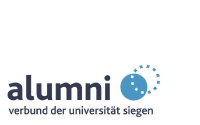Forscher-Alumni Galerie
To illustrate the diversity of the Research Alumni Network, various international researches, who visited their hosts at the University of Siegen, are presented here. The Research Alumni Gallery contains the answers to a series of questions asked of each Research Alumni about their personal background, research, and time in Siegen.
Click here to read more
about the Research Alumni Tandems, the
reseach alumni and their research cooperation topics with their
hosts at the University of Siegen.
Click here for the
Research Alumni Programme info page
(de).
Prof. Dr Onofre Martorell Nadal
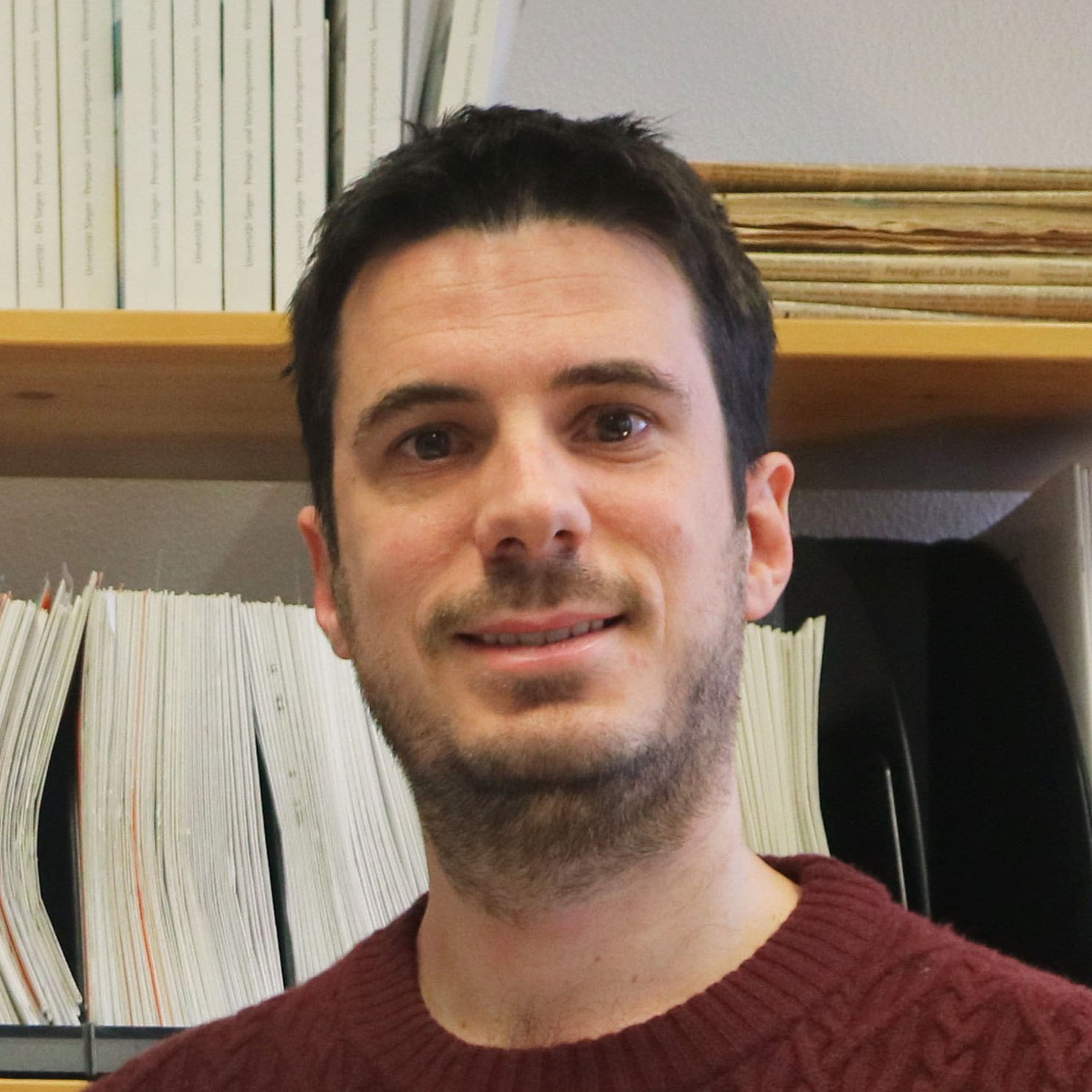
University of the Balearic Islands Mallorca, Spain
Host at the University of Siegen:
Prof. Dr Michael Möller
Computer Vision
I am currently an Assistant Professor in the Department of Mathematics and Computer Science at the University of the Balearic Islands Mallorca.
My main focus here is largely on the Fourier Ptychographic Microscopy Method, an advanced microscopy technique that images the specimen using the phase of light, allowing for the study of biological samples in their natural state. My main area of expertise and research however lies in merging images taken at different exposure times, a technique called bracketing. The resulting image possesses distinct details and colours over the complete range at the same time, from the darkest to the brightest parts of the scene.
I was looking for an internship and my supervisor Antoni Buardes, who knew Michael through one of his PhD students, suggested some names and Möller was among those. So my first visit to Siegen was during my time as a PhD student in 2022.
My aim is to stay and to get a permanent position in Mallorca. But it still would be nice to have some collaboration with Michael and the University of Siegen through our PhDs.
I like that Siegen is not a very big city. It has lots of mountains, so it’s close to hiking areas, where I can take a long walk on a Sunday. Just a little less rain would be better.
Dr. Nasir Tajuddeen
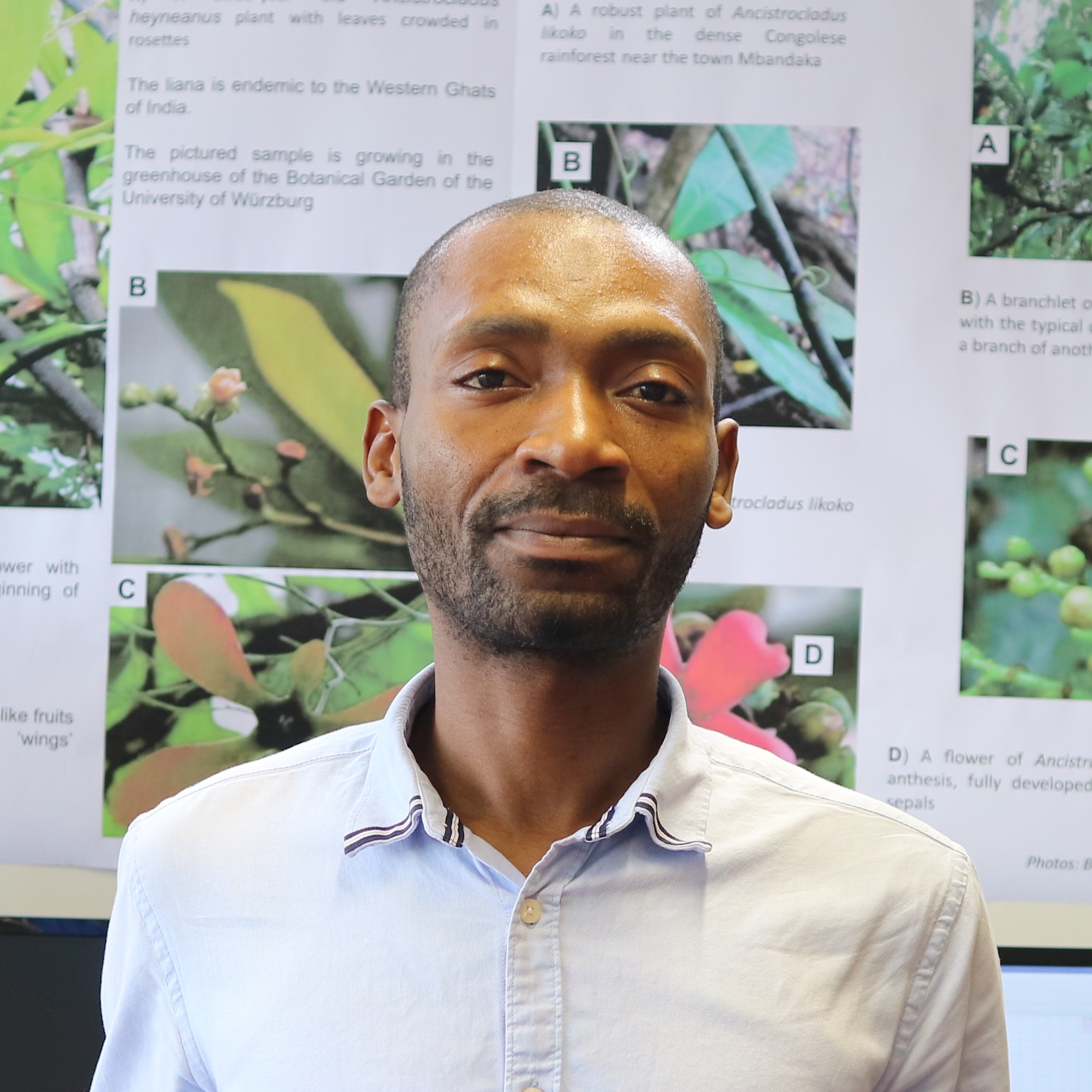
Ahmadu Bello University, Nigeria
Postdoc sponsored by Alexander von Humboldt Fellowship
(Georg Forster Research Fellowship)
Host at the University of Siegen:
Prof. Dr. Heiko Ihmels
Organic Chemistry II
I am originally from Nigeria and work there at the Ahmadu Bello University in Zaria. I am currently a postdoctoral scholar of the Alexander of Humboldt Stiftung in Siegen.
I mainly work on Natural Product Chemistry and - Bioorganic Chemistry. Natural products are chemical compounds produced by plants and other organisms. They can be broadly divided into two classes, what we call primary metabolites that are necessary for normal functioning of a living organism and secondary metabolites that a living organism does not usually need for the normal day-to-day functioning of life, but serve some secondary purposes like defense or adaptation in the environment. The primary metabolites are what you know as carbohydrates and proteins. The secondary metabolites are usually specialized chemical compounds, like alkaloids. One of the commonly known alkaloid is opium. My own specific research is on a class of natural products called Naphthylisoquinoline alkaloids. These are produced by lianas belonging to only two plant families in the entire world, namely Ancistrocladaceae and Dioncophyllaceae found in Africa and Asia.
My research aims to extract these alkaloids from plants, understand their molecular mechanisms of bioactivity and synthesize them in the laboratory to ensure a reliable and scalable source for potential medical applications.
I am conducting my research as a postdoctoral scholar in Organic Chemistry at the University of Siegen, under the guidance of Prof. Dr. Heiko Ihmels. The University of Siegen provides the necessary state-of-the-art resources, facilities, and academic environment for the research. Professor Ihmels impacts me by being a mentor and by offering his expertise in the process.
After my postdoctoral period at the University of Siegen, I will return to Nigeria to further my academic career, leveraging the knowledge and networks established during my time in Germany to advance scientific research in my home country.
Siegen is an excellent environment for my research with advanced facilities and a highly supportive academic community.
Prof. Dr. Anna Pandolfi
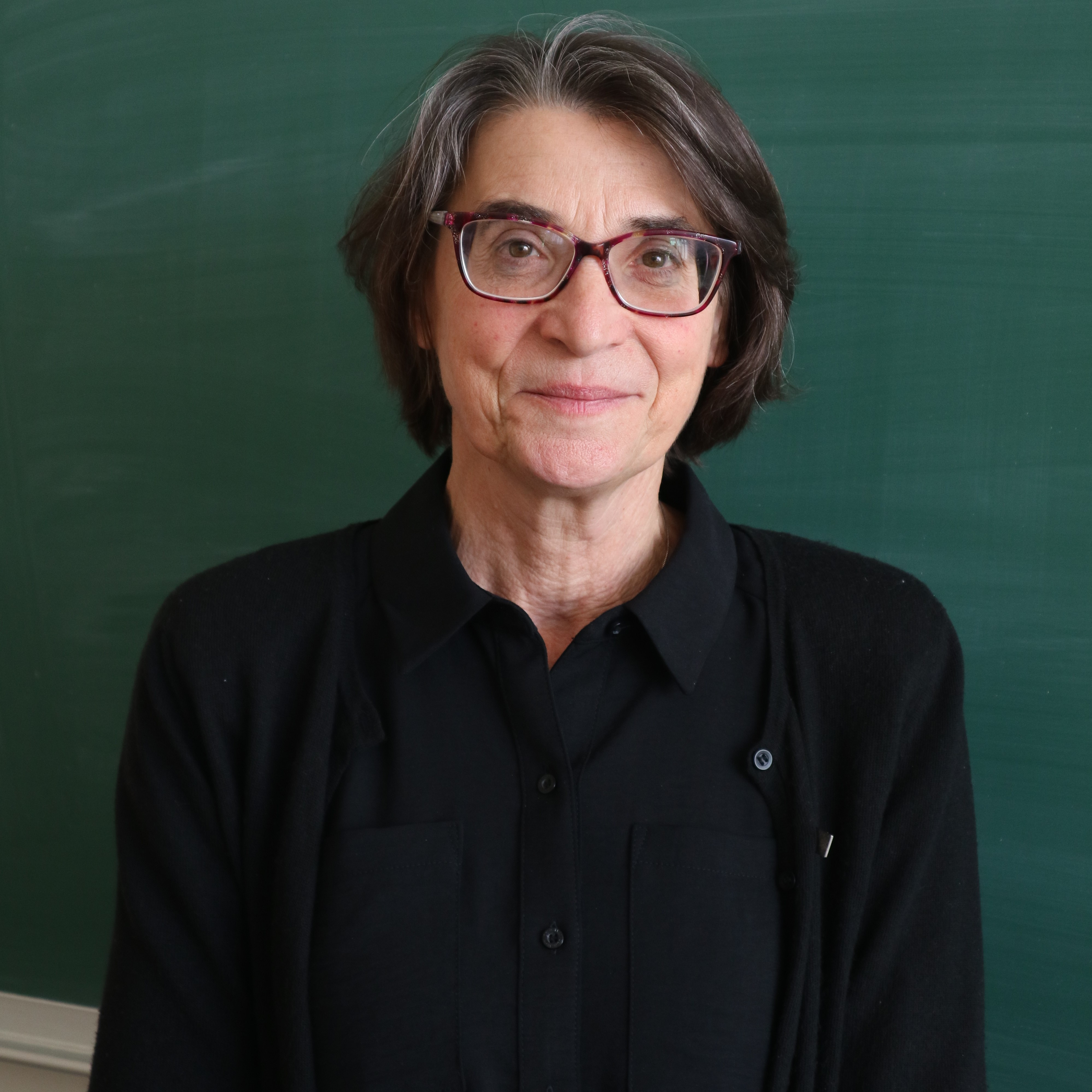
Politecnico di Milano, Italy
Host at the University of Siegen:
Prof. Dr.-Ing. Kerstin Weinberg
Solid Mechanics Group
I am a Professor of Computational Mechanics in the Dipartimento di lngegneria Civile e Ambientale (Civil and Environmental Engineering) of the Politecnico the Milano.
My main field is computer mechanic especially devoted to fractured mechanics which is the way you study the propagational rapture inside the bodies for static or dynamic courses, any kind of rapture. I am also interested in biological problems so I study the mechanical behaviour of the biological tissues like the eye or intestines.
We have been trying to develop a material that consists of concrete with inclusions that can absorb some of the mechanical energy. In this way, part of the vibration energy can be subtracted from the concrete which is then no longer so strongly exposed to this energy. This material could then be used, for example, under the rails of trains or under rotating machines in oil drilling.
I know Prof. Weinberg since 2001, when we were working on different topics at Caltech in California, sharing the same office. We quickly realised that we had many common professional interests, and so our ongoing German-Italian collaboration started.
I was looking for a way to model the behavior of the cornea of the eye. Prof. Weinberg had already worked on a small structure made by assembled traingles. Coincidentally, this 3D model closely resembled the sustaining structure of the cornea. So this model could be used in the future to support research on the structure of the cornea. New ideas are always forming, which may again be a starting idea for further collaboration."
In Italy, we do not get any money for our research. Our research is dependent on money from the industry. This complicates many things. For example, we can't build machines so easily in Italy. At the University of Siegen, we have machines that can be used for experiments. In general, there is a lot of support. If we want to use the laboratory in Italy, a lot of bureaucracy is necessary, which is not the case in Germany.
Dr. Paul Kwaku Larbi Anderson
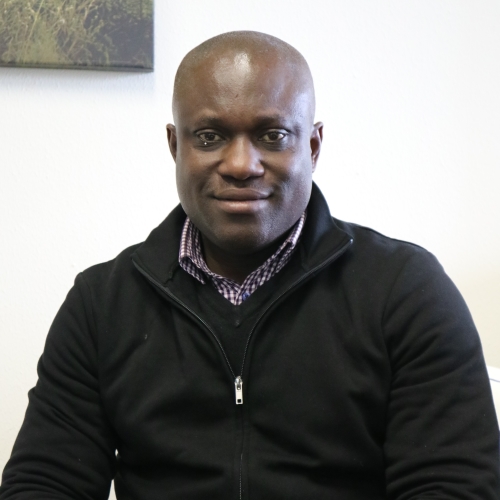
University of Siegen, Germany
Host at the University of Siegen:
Prof. Dr. Johannes Schädler
Centre for Planning and Development of Social
Services
I am a member of Prof. Dr. Johannes Schädler's FACIL-ICT Ghana research team, which is part of the Centre for Planning and Development of Social Services (ZPE).
My research focus has been on dealing with decentralization and local government, and I examine how communication problems sometimes arise between local people and government officials in decentralized government arrangements. For example, I am looking at whether existing forms of interaction between citizens and authorities can be further developed and how contacts can be facilitated in the long term.
My first contact with Prof. Schädler was as soon as I finished my master's degree in "Roads to Democracies". First I suggested to Prof. Strünck my interest in doing a PhD and he told me that he does not have the capacity to do it, but he knows another professor who works with Ghana and since I am Ghanaian he would recommend me to him. He made that recommendation and I sent my Master's thesis to Prof. Schädler. He told me he saw connections between what I did, what I am doing, and what he is doing. After that he supervised my dissertation. Now we work together.
As long as the FACIL-ICT Ghana project exists and I am able continue to work on it, I would like to work here. I will also be happy to participate in other projects that arise in this context.
Germany as a whole doesn’t take fees from students so doing my masters and PhD here was like a scholarship. I think it was very helpful to me because I was able to concentrate on my dissertations and had not to work so much. I was being supported. Also in Siegen we have a good working relations and good linkages. Especially working with Prof. Schädler and the ZPE is a great opportunity.
Prof. Dr. María Cristina Osorio Vázquez
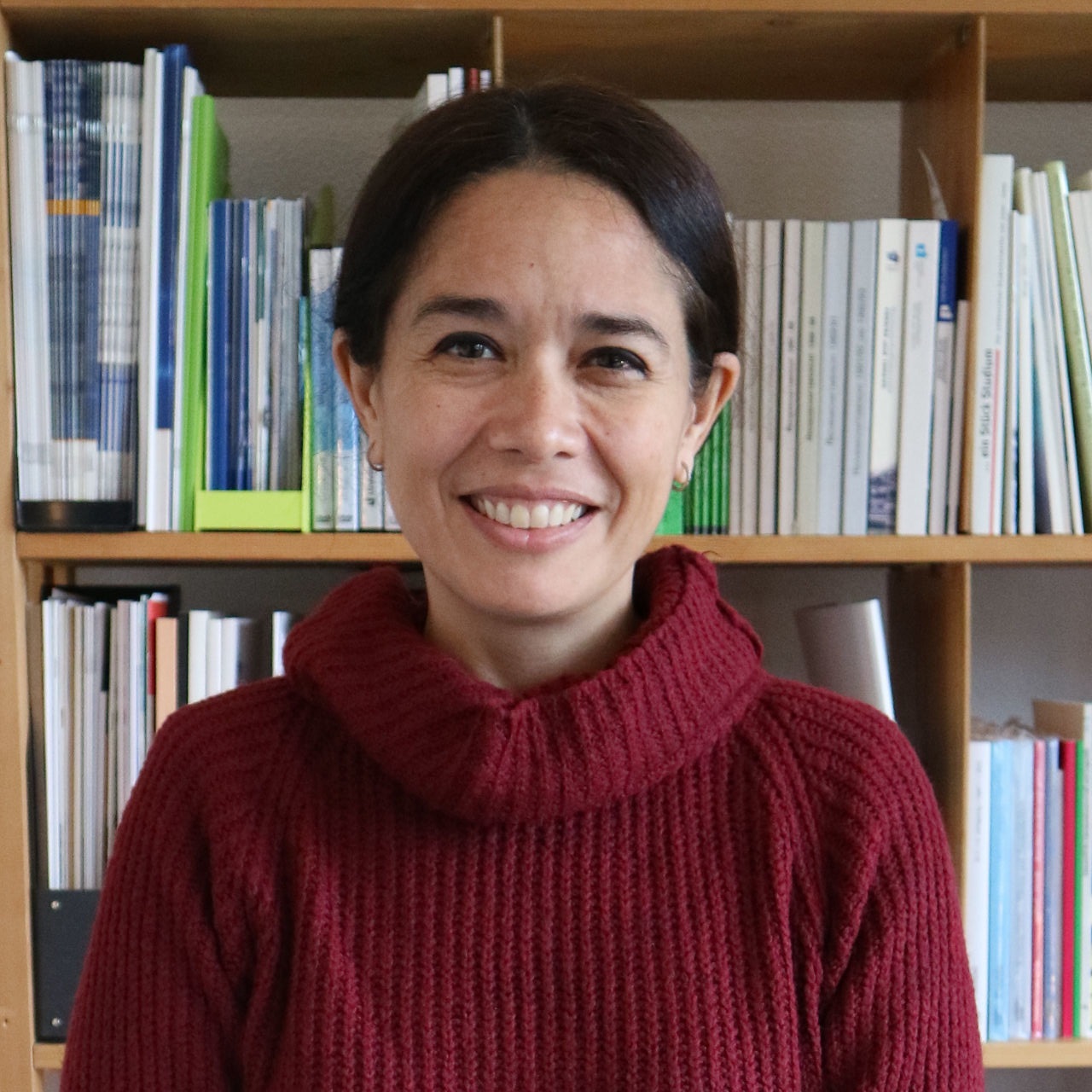
Universidad Anáhuac Mayab,
Mexico
Host at the University of Siegen: Dr.
Christian Koch
Romance languages, Applied linguistics - Didactics
I am a professor and a researcher, based in the south of Mexico, and specialize in challenges and barriers to girls’ education in Mexico, particularly for Maya girls.
Girls in indigenous communities face huge disadvantages when it comes to completing their secondary education. They often leave early because they are expected to take on the role of caregivers, or they are encouraged to stay at home once married. Once girls have left education, is it extremely difficult for them to come back and complete it later. I am investigating how to support girls from disadvantaged backgrounds so they can re-join education after having left.
I have come to Siegen to work with Christian on a joint project. We want to understand the approach taken by the German education system to keeping girls in school. To do this we will undertake some field work in cooperation with schools in the Siegerland region. We are planning our field work so that we have the chance to go into classrooms and to speak to people about their experiences.
I met Christian at a conference in Munich in 2017, his research was looking at bilingual education for indigenous children in Ecuador. We saw many similarities in our research and in the approach we are taking to our research, so we stayed in touch and decided to work together further.
We will continue our field work and getting to know the communities around Siegen. I will be in Siegen for 18 months altogether. By publishing our findings we hope to serve our communities, and to help girls from disadvantaged backgrounds to have the best life chances possible.
Siegen is not the largest place, but for me this is a plus, as long as my basic needs are met, I prefer smaller communities. Siegen has so many small communities around it which I greatly enjoy spending time in. It is important for me to be able to get to know people around me. Especially when you are a teacher, I want to feel like a part of the community.
Prof. Dr. Jordi Jané-Lligé
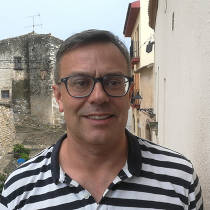
Autonomous University of
Barcelona, Spain
Host at the University of Siegen:
Univ.-Prof. Dr. Niels Werber
Department of German – Modern German Literature
I am from Barcelona and work as a lecturer and researcher in the English and German Studies Department of the Universitat Autònoma de Barcelona.
My field of work is German studies and the theory and history of translation. For several years I have been trying to apply the systems theory perspective to the analysis of literary translation processes. Currently I am working on the translations of Günter Grass into Catalan and Spanish.
My research visit to Siegen is rather short, only three months. This is because it is for a very specific project, namely the analysis of two existing translations of the Gunther Grass novel The Tin Drum into Spanish (and Catalan?).
After reading many of Prof. Werber’s published research, I found his contributions to the field of systems-theoretical literary studies very inspiring, so I reached out to him so that we could collaborate. After being in contact for several months we decided that it would be good for me to undertake a research visit to Siegen, and with the support of a DAAD scholarship I was able to do so.
I would love to come back to Siegen. Prof. Werber and I are currently hoping to be able to start sending students on exchanges between our two institutions, but this is still in the planning stages at the moment.
It has not been so easy for me to experience Siegen during my stay here because of the pandemic, however I believe that this city is ideal for a university, it is not too big, very green, and it is easy to reach everywhere. I have also noticed that the University is working to bring more of its faculties into the city itself.
Dr. Zhen-Peng Xu
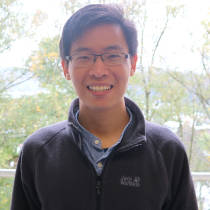
Chern Institute of Mathematics,
China
Host at the University of Siegen:
Univ.-Prof. Dr. Otfried Gühne
Theoretical Quantum Optics Group
I am a postdoctoral researcher at Prof. Gühne’s research group. I originally planned to stay in Siegen for one year, but then I successfully applied for an Alexander von Humboldt scholarship, which allowed me to extend my stay here for two more years.
My research is focused around quantum optics. When I first came to Siegen my research was mostly on contextuality. Contextuality looks at how we measure quantum elements that are in a sense unmeasurable. Every measurement will change the thing you are trying to measure in some way, so each measurement could have no definite result. To get around this we express properties of these elements in terms of a range of probabilities. I later reached a turning point in my research, after which I moved my focus to quantum networks. Quantum networks embrace a rich structure and are promising in application. In this field we seek to understand interactions between quantum elements which could be used in quantum processing.
I came to Siegen in order to expand my horizons and to have the chance to work with Otfried and the other researchers in his research group. There are not so many research groups specialised in this particular area of quantum physics so it is always great to be able to share my results and discuss the latest developments with others who are working in the same field as me.
I first got to know Otfried through my former PhD supervisor, who has been working with him for many years. During a conference in Zurich Otfried and I began to discuss the possibility of me undertaking a research visit to Siegen. I arrived firstly in SIegen in autumn of 2018 to begin my visit. After some time in Düsseldorf learning German, I came back to Siegen in early 2020 to continue my visit.
Once I am finished with my research visit to Siegen I will return to China to be close to my family, but I am confident that myself and Otfried will continue to collaborate in our research in various ways.
Siegen is a great place for my research, it is quiet and close to nature so there are not so many distractions. The university is a nice size and I am able to get to know everyone in my research group well. One culture shock for me was getting used to the shops being closed on Sundays!
Dr. Aritra Sarkar
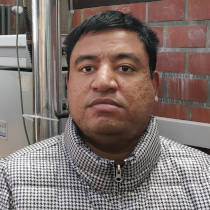
Indira Gandhi Centre for Atomic
Research, India
Host at the University of Siegen:
Univ.-Prof. Dr.-Ing. Hans-Jürgen Christ
Chair of Materials Science and Testing
I am presently working as a postdoctoral researcher at University of Siegen supported by the Alexander-von-Humboldt research fellowship. I originally work as a scientist at Indira Gandhi Centre for Atomic Research, India since 2010 and finished my Ph.D through JSPS RONPAKU fellowship from Nagaoka University of Technology, Japan.
My research work is mainly in the area of high cycle fatigue (HCF) and damage interaction between low and high cycle fatigue (LCF-HCF interaction) on austenitic stainless steels and Ni-based superalloys commonly used in power plants. I am actively involved in characterizing deformation mechanisms under such loadings, which are critical issues for the reliability of structural components. Based on the test data, I have generated design curves at high temperatures (Haigh diagram) and devised new methodologies for modification of fatigue design rules.
My research at University of Siegen is focussed on very high cycle fatigue (VHCF) which is a topic of significant interest in view of the present technological developments, particularly from the viewpoint of life-extension of structural components which are subjected to vibratory stresses during the operation. My aim is to re-evaluate the S-N curves extending to the VHCF range involving the effect of prior LCF cycling, which simulate the actual loading scenario, so that components experiencing such multi-level loading can be designed more accurately.
I became aware of Prof. Christ’s pioneering work from the beginning of my career due to the strong research collaborations between IGCAR and University of Siegen. So, when I decided to work on VHCF, the Chair of Materials Science and Testing at University of Siegen became almost a natural choice. It is a great experience working here and I thank prof. Christ for giving me this opportunity.
On returning back to IGCAR, I plan to expand my work on HCF/VHCF on austenitic stainless steels, especially how multi-level loading influences VHCF and developing suitable modelling approaches based on the test data. I look forward to future collaborative visits at University of Siegen to carry out VHCF tests at high temperature where damage mechanisms become more complex with synergistic effect of creep, oxidation etc. on cyclic loads.
Siegen (Weidenau) is a nice city with hilly landscape and beautiful sceneries around. Its very comfortable living here. The winter seems to be tougher though, especially for us who are more accustomed to a warmer climate.
Dr. Mohammad Marvi-Mashhadi
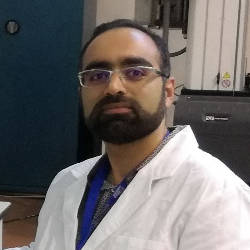
University Carlos III de Madrid,
Spain
Host at the University of Siegen:
Univ.-Prof. Dr. Kerstin Weinberg
Chair of Solid Mechanics
Department of Mechanical Engineering
I am a Research Associate at the Nonlinear Solid Mechanics group, Department of Continuum Mechanics and Structural Analysis, University Carlos III de Madrid, Spain
Continuum Mechanics and Structural Analysis, Computational mechanics
Development and validation of a modelling strategy based on finite element (FE) analysis of a representative volume element (RVE) of a functionally graded (FG) foam microstructure.
I am currently involved in a project with objective of finite element modelling of acceleration-induced pressure gradients and cavitation in soft biomaterials. This collaboration is in form of mentoring of PhD student supervised by Professor Kerstin Weinberg in Department of Mechanical Engineering at Siegen university.
After I have finished my time as a visiting scientist to Siegen research project in Siegen I will definitely try to come back again to Germany to continue my research activities.
I found Siegen to be the ideal place to concentrate on my research and study, while avoiding any distractions caused by daily life. The nature is fantastic and absolutely eye-catching. I enjoyed walking beside the river almost every day. I would describe it as a really cosy place to live with all facilities you might need and well connected to the rest of Germany. The university environment was really dynamic and my time there was one of the most productive ones. I would like to thank all those who work at the university, especially those who work in the welcome center for international researchers. They have made me and everyone else coming to Siegen feel at home here, thanks to them my stay here will be a memory that will never be forgotten.
Dr. Rusa Mandal
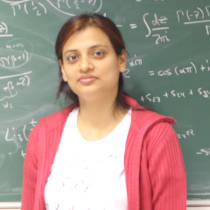
Instituto de Fisica Corpuscular,
Spain
Host at the University of Siegen:
Univ.-Prof. Dr. Thomas Mannel
Theoretical Particle Physics I
I am an Alexander von Humboldt Post-Doctoral Fellow. Since receiving my fellowship I have been based at the Theoretical Particle Physics I research group at the University of Siegen. Before I came to Siegen I was a Postdoctoral Research Scientist at the Instituto de Fisica Corpuscular, a CSIC - Spanish National Research Council - and University of Valencia joint center in Spain. Originally I am from India.
My research specialty is in particle physics phenenomology. In this field researchers combine theoretical models with experimental results in order to better understand interactions between subatomic particles. For example we might compare results from the Large Hadron Collider with our own calculations to see whether they’re the same, and if not, we will then change our model to better fit experimental data.
One of the most important models in all of physics is the Standard Model. This model brings together Most of the forced which govern our universe together . However there are still large gaps in our understanding in different parts, particularly with regard to elementary particles. My current research is focused on the behaviour of one particular kind of subatomic particle called a Meson.
I first became aware of Prof. Mannel and his work by reading some of his publications. My first time in Siegen was in 2013, when I came here to deliver a seminar. Since then I have kept in contact with Prof. Mannel, and we decided to see if I could come back to Siegen in order to continue my research. I was able to do so thanks to the support of the Alexander von Humboldt foundation.
In the longer term I would like to try to find a more permanent position at an institution in India, closer to my family. However I very much like the research environment here, and I would definitely be open to spending more time in Siegen or Germany.
The University may be relatively small, but the Phenemonology group here is one of the largest in the world, so I very much appreciate being surrounded by so many other researchers who understand my research. However it is still small enough for me to be able to simply knock on someone’s door if I wish to talk with them.
Dr. Dipankar Das
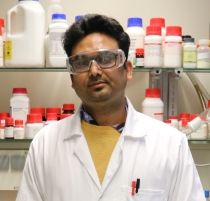
Seoul National University of
Science and Technology, Republic of Korea
Host at the University of Siegen:
Univ.-Prof. Dr. Holger Schönherr
Chair of Physical Chemistry I
Before I came to Siegen, I was a Postdoctoral Research Scientist at the Seoul National University of Science and Technology, South Korea. Afterwards, I became an Alexander von Humboldt scholar. I came to Siegen for two years to work on a new research project.
My research field is polymer chemistry, specifically the fabrication of biopolymer-based crosslinked networks. By chemical modification of biopolymers, we can develop interesting kinds of materials called hydrogels or nanogels. These gels possess outstanding properties like 3D structure, porosity, swelling behaviour, cyto-compatibility etc. These kinds of properties enable them to be used in biomedical applications, such as drug delivery, tissue engineering, bio-sensing etc.
One reason why I came to Siegen was to learn and develop a new methodology for the fabrication of biopolymeric nanogels. Nanogels are physically or chemically crosslinked networks of natural or synthetic polymers with at least one dimension at the nanoscale (<100 nm), hydrophilic or amphiphilic, and can be ionic or non-ionic. Apart from conventional methods of nanogel synthesis like self-assembly, emulsion, and lithography, we are attempting to see whether chemically crosslinked biopolymeric nanogels can be synthesised through a new method called "extrusion". This alternative method may afford the synthesis of biopolymer-based elongated nanogel fibres with high aspect ratio. Having spent more than 1 year, now I can say that we have been successful. I am now examining how we can use this kind of nanogel fibres for biomedical applications like drug delivery or bio-sensing (bacterial detection in wounds or drinking water).
I came to know about Prof. Holger Schönherr from my Ph.D. supervisor, who undertook a research visit to the University of Siegen, while I was studying my PhD. I was inspired to come to Prof. Schönherr´s lab in Germany to work with him. After the finishing my Ph.D., I applied for a postdoctoral position in Prof. Schönherr's lab. He suggested me to apply for an `Alexander von Humboldt Postdoctoral Fellowship`. As it takes a bit time to prepare all the necessary documents for the AvH Fellowship, I went to South Korea and worked there as a Postdoctoral Fellow. I was in a regular contact with Prof. Schönherr by mail and still hoped to one day come to Germany. My successful research proposal submitted to the Alexander von Humboldt foundation allowed me to come and work in Prof. Schönherr´s lab, University of Siegen, Germany.
After the completion of my research in Siegen, I will first apply for an academic position in India. My future goal of research is work with natural materials in a social context for broad field of applications.
I admire how much German society values education rather than money. I enjoy Siegen very much; I have everything I need here. The only problems are how much it rains, and having to walk up the many hills. Although it is good exercise. I am truly grateful to the AvH Foundation, the German Government, Prof. Schönherr, and the University of Siegen for giving me the best opportunity in my life. Thank you, Thank you very much all.
Prof. Dr. Abdelhadi Soudi
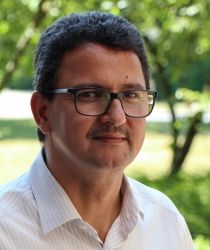
Ecole Nationale Superieure des
Mines, Morocco
Host at the University of Siegen:
Univ.-Prof. Dr. Kristof Van Laerhoven
Research Group for Ubiquitous Computing
I am a full professor in Morocco, at the Ecole Nationale Superieure des Mines. I am here at Siegen University as an Alexander von Humboldt Foundation Research Fellow.
My research is focused on natural language processing, a branch of Artificial Intelligence, that tries to create tools for processing human languages for diverse applications, such as Machine Translation, Question Answering and Information Retrieval systems, to name but a few. What we try to do is to get computers use human languages in the same way (or better than how) humans use them.
During my so far two research stays at Siegen University's Ubiquitous Computing Lab, I have been collaborating with Professor Van Laerhoven Kristof to build a technology that enables the deaf community to document their Sign Languages. Together, we have been trying to harness the power of science and technology to improve the lives of an underserved segment of society, namely deaf and hard of hearing people. Our research will (i) result in tools and resources that will improve deaf people's access to STEM education, in particular, and (ii) help create a barrier-free society.
I got to know Kristof’s work when I read one of his publications which examined the possibility of using sensors in sign language recognition. While reading it I saw that we are actually trying to accomplish very similar things from different perspectives. I strongly believe that interdisciplinary research is key to future scientific breakthroughs.
My research collaboration with Professor Van Laerhoven has been very exciting and fruitful. Professor Van Laerhoven and I have recently been awarded the BMBF German-African Innovation Incentive Prize for our joint work "Africa-Sign: A crowd-sourcing platform for the Documentation of STEM terms in African Languages". This will allow us to use the funding to expand the horizons of our new project. We will, of course, sustain this collaboration, not only between our institutions, but also with other institutions in Germany, the Netherlands, the United States and four other African institutions based in Kenya, Ivory Coast, Ghana and Ethiopia.
Before I came to Siegen, I had been at universities in much bigger cities in Germany and the United States. At first, it did not seem like Siegen had as much to offer. But then I discovered that behind the trees here, there is a paradise. I started discovering the beauty of Siegen. At weekends, we would take the train to visit the surrounding landscape and really have the chance to enjoy the Siegerland’s incredible landscapes. The city itself and the University of Siegen are also rapidly developing. There is also a lot of industry here, with many giant companies manufacturing heavy machinery and other technologies for several international clients.
Dr. Sam Hind
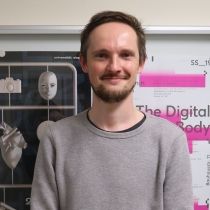
University of Warwick, U.K
Host at the University of Siegen: Dr.
P. Abend
Graduate School Locating Media
I am currently a Research Associate at a graduate college situated within the University of Siegen called “Locating Media.”
I’m interested in digital navigation, which examines how people use digital media, platforms, and technologies, to move through the world. One example of this, which I studied during my PhD, would be how protesters can make use of maps on their smartphones to navigate protest events. These maps were crowd sourced, enabling them to be updated in real time by users messaging the map creators with various insights, such as the location of police or areas with outbreaks of violence. Making use of this map allows people to orientate themselves during a demonstration, and to avoid areas which are a bit more risky.
I’m now working on a project about autonomous vehicles. In future, autonomous vehicles will, instead of making use of human drivers or external media, have their own navigational capacities. This means that you will be able to put your route into it and it will then navigate itself taking into account things such as traffic, roadworks etc. to find the quickest way to your destination. For me autonomous vehicles are really a metaphorical vehicle for thinking about how navigation has changed and is changing. Everyone has an opinion on it and it’s quite interesting to talk to people and to hear what they think about them.
The first time I came to Siegen was a number of years ago, when I was invited along with some colleagues to speak at an event hosted by Locating Media in the Artur-Woll-Haus. I met lots of really nice people there who were doing work on mapping and digital media that I was really interested in and that I hadn’t encountered before. And then a couple of years ago I saw that they were advertising some positions here, and after applying for one of them, I received a 3 year position here in Siegen.
I will continue to work upon my research here at locating media, while continuing to publish and to present my research at different conferences. If we were to take a look at the future of autonomous vehicles, the literature tends to talk in 5-10 year periods. In 5 years’ time, a certain level of autonomy will be reached where certain manoeuvres or activities previously done by human drivers will instead be done automatically, such as automated parking and lane changing systems. However full autonomy is probably a very long way off, in fact it may not be possible at all. There aren’t just technical barriers, but also legal, cultural, sociological, and ecological ones. And whatever happens people will continue to have a desire and interest in driving.
As someone who lives in Cologne, I do sort of embody the distanced researcher. But as someone who’s trained in geography and interested in the history of places, I find Siegen to be fascinating. I love the work of Bernd and Hilla Becher, who photographed various disused and derelict industrial sites in and around NRW. They also have strong ties to Siegen through Bernd, who was born here. I’m into walking and hiking as well, and Siegen really is the perfect location for it, particularly the Rothaarsteig. Another highlight of Siegen for me is the commute here from Cologne. Having previously done commutes between Manchester and Coventry in the U.K, the trains were always delayed and expensive, and the view out of the window was always rather grey and dull. While the route from Cologne to Siegen follows the river Sieg, and it has lots of vegetation which looks beautiful whatever the season. Siegen has been good for my wellbeing.
Dr. Joseph Thierry Ndongo
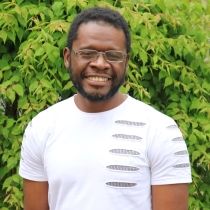
University of Yaoundé I,
Cameroon
Host at the University of Siegen:
Univ.-Prof. Dr. Heiko Ihmels
Chair of Organic Chemistry II
I am a senior lecturer at the University of Yaoundé I, and an Alexander von Humboldt research fellow.
I am working on natural product chemistry, including the isolation and structural elucidation of bioactive natural products. I am especially interested in indole and carbozole alkaloids. Alkaloids are a very nice and complex class of compounds with multiple bioactivities.
During my PhD and Postdoctoral research, I have developed skills in the isolation and structure elucidation of natural products. Some of them were very interesting because they showed some potential anticancer activity. However it is not sufficient to only isolate these compounds and to assess the biological activity, I also wish to understand how these compounds interact with DNA, so I wish to develop my research along this new field. One of the reasons I was interested to work with Prof. Ihmels is because he has a very good expertise in that field.
Another reason I have come to Germany to work with Prof. Ihmels is having access to better equipment. Once I have isolated some compounds, I need equipment to properly analyse the compound’s structure. In Cameroon this can take quite a long time, which forces me to find other things to do while I am waiting for my results. In Germany I am able to obtain my results faster, and then to immediately start interpretation of those results, which enables me to make much faster progress.
In the past I have made multiple research visits to the University of Göttingen. After my host there retired, I of course wanted to continue the work that I had already started here in Germany, so I sent an email to Prof. Ihmels in which I presented my current project. He then accepted my proposal and invited me to his Lab in Siegen for my next research visit.
An important reason why I have come to Siegen is to establish a fruitful and long-term academic cooperation with Prof. Ihmels. It would be wonderful for him to visit Yaoundé in future in order to do a seminar or make a presentation.
Siegen is a nice city with a lot of bridges and a beautiful landscape. I find it to be a good place for a student who wants to study and to be at the forefront of progress. I also like the fact that my campus here is located on a hill; it reminds me of my home university in Yaoundé, we call it the hill of knowledge.
Dr. Mathias Decuypere
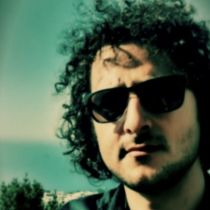
KU Leuven, Belgium
Host at the University of Siegen:
Univ.-Prof. Dr. Jutta Wiesemann
Department of Education and Psychology
I’m an assistant professor at KU Leuven. I am also on the tenure track towards becoming an associate professor. I believe in Germany I am the equivalent of a W1 professor (Juniorprofessor).
I focus largely on digital education settings, where I aim to develop new, qualitative methods to investigate such digital settings. An example of what we do is qualitative website analysis, where we try to make sense of what happens on those websites we use. These kinds of technologies allow us to do so many things, but on the other hand they also steer us in certain directions and assume us to be particular types of persons. Another example is the development of visual network analysis, which is a qualitative method to construct and analyse the visual properties of sociomaterial networks.
I wanted to come to Germany to experience a different approach to social science research. From a Belgian perspective the interdisciplinary approach to the research group here is quite unique, because here there are a variety of different disciplines are all gathered around this central concern of digital media. Whereas in my home country, the other people I see on an everyday basis are all based in educational research, so it’s more of a disciplinary silo. In Germany it all it starts from interconnectedness. I had heard about this in Leuven, but I didn’t just want to read about it, I felt that merely reading the literature is fundamentally different to having the chance to experience it for myself, so I came here to be able to do so.
I came to Siegen because of my close working relationship to Dr. Tobias Röhl, who works at the University of Siegen’s “Media of Cooperation” Special Collaborative Research Center. We have cooperated on many different things in the past, including a winter school in which he was a speaker. I wanted to do some research in Germany, so I asked him which places would be suitable. After narrowing it down to a few options, and following my gut, I ended up choosing Siegen.
We will continue the cooperation between Leuven and Siegen. For example, in January we had a winter school in Siegen that I co-organised together with Inka Fürtig and Jutta Wiesemann about ethnography in digital contexts. In the Summer we are planning to have a second iteration of this in Leuven, and then we hope to come back again to Siegen and to then alternate between both universities.
I am a bit tired of Germans belittling little towns as if they don’t count or are not worth visiting or staying in because they’re not megacities. I find that very strange because why would a city need to be big in order to be interesting? For me there’s nothing wrong with not being Hamburg, Munich, or Berlin. The fact that you’re close to nature, close to the forests, is really fantastic, you can just hop out and be experiencing nature after walking for only two or three minutes.
Dr. Alisa Shpak
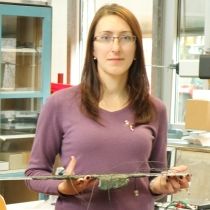
Kuban State University, Russian
Federation
Host at the University of Siegen:
Univ.-Prof. Dr.-Ing. Claus-Peter Fritzen
Chair of Technical Mechanics
I am a scientific associate and a teacher in Applied Mathematics at the Kuban State University in Krasnodar, Russian Federation.
The main field of my research is mathematical modelling of mechanical phenomena. A lot of engineering applications are based on the theoretical calculations made with the help of mathematical models. I use numerical and analytical methods to develop mathematical models and to afterwards write computer implementation for them.
My last visit to the University of Siegen was in November 2016. As I said before, my research field is mathematical modelling. And in order to be sure that the developed mathematical model is reliable and trustworthy one has to verify it. There are different ways to verify a model: you can compare the results with the same calculations published by other scientists. But in this case, you have to calculate the same values as that done by other research. The other way to verify a mathematical model is to perform experiments and compare the theoretical results with the data gained from the experiments. That is exactly what I am doing here. Prof. Dr.-Ing. Fritzen has a very nice lab here in the University of Siegen. I am able to make the set of experiments with piezoelectric actuators in order to verify my mathematical model. That is what I did during my last research visit.
I think the collaboration between Prof. Dr.-Ing. Fritzen’s working group and my working group back in Russia started before I came to Professor Glushkov’s group as a PhD student. From my perspective, we mainly do mathematical modelling in different fields of elastodynamics. In Siegen they have projects related to the real problems in industry. Such collaboration allows us to take part in the solving of the real-world problems. This enables us to model something which is really interesting and urgent.
Since the collaboration of the two working groups started, several joint papers have been published. The first one was published in 2012. I hope the results of my current work here will lead to another joint paper. Moreover, I would like to continue the collaboration between our working groups.
I love the University and the lab. Everything is made so that nothing interrupts me from my project. All the conditions to work and research are fulfilled in the University. And of course, I love Prof. Dr.-Ing. Fritzen’s working group! Everyone is so nice to me! They always try to help me. I really appreciate this opportunity to work with such kind people. Even though I have to admit that the weather here is too rainy from my point of view. But this is even better for research purposes: no temptation to go outside.
Assoc. Prof. Dr. Kathleen Clark
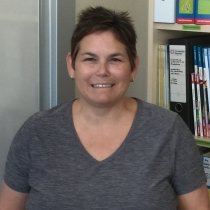
Florida State University, United
States
Host at the University of Siegen:
Univ.-Prof. Dr. Ingo Witzke
Chair of Mathematics Education
I am an Associate Professor at the School of Teacher Education at Florida State University, Tallahassee, United States, where I have been since 2006. I also worked as a high school mathematics teacher for many years.
My primary research interests are the history of Mathematics and Mathematics Education.
I came to Siegen in order to work with Prof. Dr. Witzke on designing seminars to help mathematics students. Many students who study mathematics at university struggle in their first few semesters because the style of teaching is so different. At the bachelor level in Germany the dropout rate for mathematics is about 50%.
Our seminars help students through this transition by explaining clearly what the differences in the style of teaching are. We use examples from history to help students to understand why there is such a difference between university and high school mathematics.
We began our scientific collaboration in 2014, after we started to discuss research ideas while we were both at a European Summer University in Copenhagen. Since then we have made multiple research visits to one another’s universities, and published our findings in joint publications.
We plan to visit one another to continue our collaborative work. Our research strongly benefits from different perspectives that international cooperation can bring. Most of the research in which I engage is highly dependent upon such international collaborations.
This particular institute is really unique in that the individuals that are here help to create one of the most well-connected, inviting, and motivational workplaces that I’ve been in.
Dr. Sami Farag
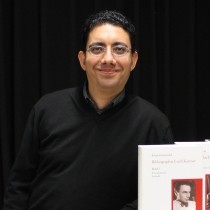
Minia University, Egypt
Host at the University of Siegen:
Univ.-Prof. Dr. André Barz
Chair of Theatre Pedagogy
I currently work as a lecturer of German Studies and German as a foreign language at Minia University in Egypt. For my six-month research visit to the University of Siegen, I received a scholarship from the Katholischen Akademischen Ausländerdienst (KAAD) - Catholic Academic Exchange Service.
- Post-war German Literature, German as a second and foreign language, Intercultural literary studies – comparative, study of Arabic and German Literature.
Post-war German Literature, German as a second and foreign language, Intercultural literary studies – comparative, study of Arabic and German Literature.
Thanks to my previous positive experiences, I decided to come back to Siegen once again for my current research project. I worked on my research here in cooperation with Prof. Dr. Barz.
This project was about ”Erich Kästner as a playwright.” The interesting thing is, that Erich Kästner is known as a poet and as an author of children’s literature, not as a playwright. I would like to thoroughly examine three different areas of Erich Kästner’s theatre work: his critiques, his cabaret, and finally his plays. This varied literary examination of the theatre shows the relevance of the theatre in Kästner’s life and, also emphasises the various possibilities of writing for theatre.
Siegen is a beautiful and green city, which is ideal for study and research. As a doctoral student I was fortunate enough to benefit from a lot of support from my faculty, and I also came to appreciate the excellent facilities of the university library. Siegen is also a changing city, there have been many new developments since I went back to Egypt. Throughout my doctoral studies I have gotten to know many kind people and have made many lifelong friends.
Dr. Avijit Kumar Das
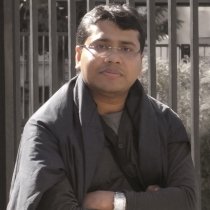
Osaka University, Japan
Host at the University of Siegen:
Univ.-Prof. Dr. Heiko Ihmels
Chair of Organic Chemistry II
I am an Alexander von Humboldt Postdoctoral Fellow currently working on an independent research project at the University of Siegen. Before I did my post-doctorate at the Osaka University in Japan. Originally I am from India.
- Synthesis of small fluorescent molecules, DNA binding, Intercalator-receptor conjugates, light-up probes and development of dual-mode chemosensors.
After my PhD in India, I went out for my first post-doctorate to Osaka University in Japan to continue my post PhD research. I then got the prestigious Humboldt Fellowship award from Germany for my postdoctoral research stay at University of Siegen for 2 years under Prof. Dr. Ihmels.
Based on my doctoral research background on different chemosensors development and the application of the sensors for sensing of different analytes and being inspired by Prof. Dr. Ihmels, I decided to apply for an Alexander von Humboldt Postdoctoral Fellowship in Germany. After my successful application, I was selected for this fellowship in 2016 under Prof. Dr. Ihmels and I came here in May, 2017 to continue my Humboldt postdoctoral project. This project is based on an extension of my previous research expertise by the development of the dual-mode chemosensors for the simultaneous detection of nucleic acids and biologically relevant small molecules.
I hope to receive some EU funding to continue my research here or possibly at another European university.
Siegen is a very nice city, close to nature and beauty, during winter snowfall it looks like heaven. Finally, I would like to express my appreciation to the nice people of Siegen, especially my post doc supervisor Prof. Dr. Ihmels and my lab colleagues for their help and support as well as all the staff of the different sections of the University of Siegen, who make new students feel welcome through their kind behaviour. I am also grateful for those who create a friendly environment for us by building up a network between the international students and researchers.
Assoc. Prof. Dr. Todd Peterson
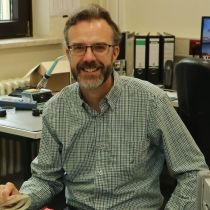
Vanderbilt University, United
States
Host at the University of Siegen:
Univ.-Prof. Dr. Ivor Fleck
Experimental Particle Physics
I am an Associate Professor of Radiology & Radiological Sciences at Vanderbilt University Medical Center in Nashville, Tennessee, United States.
My primary field of research is focused on developing new radiation detector technologies to improve the spatial resolution and the sensitivity of nuclear medicine imaging technologies, such as SPECT and PET. I look at it from the standpoint that if we can make better imaging systems then we can get better data which will allow physicians to make better decisions.
This research visit allowed us to gather resources and people in one place to dedicate the time necessary to our research to make some real progress. We have two main detector technologies that we are currently working with to test the feasibility of our new concept for gamma-ray imaging: one, which was shipped here by our collaborators at the University of Arizona, provides a means to address some fundamental physics questions, and another system representing a possible approach to turning this into a real medical imaging system. These two aspects provide a really nice balance to our research, and my time here has provided us with an opportunity to try to do some experimental investigation of this idea that previously has only been explored via simulations.
This is what you might call a second generation research collaboration, which is building upon a collaboration started by Prof. Dr. Brill and Prof. Dr. Walenta, who originally met while they were both at Brookhaven National Laboratory in the 1970s. Prof. Dr. Brill came to Vanderbilt, and Prof. Dr. Walenta to Siegen, but they continued to work together on various projects over the years, getting me involved shortly after I came to Vanderbilt. While we were all sitting in Randy’s office in Nashville, we came up with an idea for an entirely new way to try to do image high energy gamma rays. The problem is that as you go to higher energies, the usual techniques don’t really work anymore. We had an idea for a component within a Compton camera that could potentially detect these gamma ray interactions with a high spatial resolution. It was an out-there idea, but we did some calculations, and Prof. Dr. Walenta wrote a simulation that suggested it could work. What we needed to do next was to test our idea through experimental research. Prof. Dr. Walenta was retired at this point, so he contacted Prof. Dr. Fleck, who was able to begin research. To have the chance to participate in this research myself, I wrote an application to the DAAD for a research visit, which has allowed me to come to Siegen for eleven weeks to work on this project together with Prof. Dr. Fleck and his department.
While we haven’t gotten the fundamental question of whether this new approach will work answered just yet, we do have some preliminary data that show there’s potential and also that we have some technologies that are applicable to it. To continue to scale this up we will need some dedicated funding, so we are currently discussing that. Our results so far are a good basis for applying for more funding to continue.
Siegen has been quite fun, one of the things I really enjoyed is that there have been a lot of festivals and cultural activities, such as the city festival and the night of a thousand lights. I also really enjoyed hearing live music on Wednesday nights throughout the summer. I live in Nashville, which is known as “Music City”, but I‘ve heard an awful lot of live music here which I’ve really enjoyed.
Dr. Xiaoqiu Dou
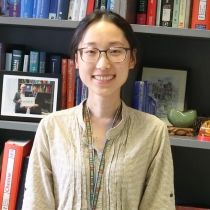
Shanghai Jiao Tong University,
China
Host at the University of Siegen:
Univ.-Prof. Dr. Holger Schönherr
Chair of Physical Chemistry I
I am currently a researcher at the Shanghai Jiao Tong University, China.
Physical chemistry and material science, my research specialities include the development of stimuli-responsive supramolecular hydrogels, the utilisation of structures found in rose petals to improve cancer cell detection efficiency, and the development of 3D cell cultures.
I have used my time in Siegen to conduct some post-doctoral research into various research projects. One of those projects was using the natural structures found in rose petals to improve the detection efficiency of cancer cells in the bloodstream. We use structures found in rose petals and other natural materials because they are difficult to replicate artificially. By detecting cancer cells in the blood stream, we are able to detect the stage at which the cancer is at the beginning, which is very useful for determining the best course of treatment.
Another exciting project is developing 3D cell cultures for drug testing. Traditional drug testing utilised 2D cell sheets, which did not resemble the 3D cell spheroids found in actual tumours. Through my research here in Siegen I was able to form 3D cell structures inside cultures, which more closely resemble the structures found in actual tumours. This will hopefully make the testing of certain types of cancer drugs more efficient.
I got to know Prof. Dr. Schönherr through my PhD advisor, who was himself a PhD student of Prof. Dr. Schönherr. In 2016 I received a Humboldt Scholarship which enabled me to come to Siegen to complete my post-doctoral work. I stayed in Siegen until January 2018, when I returned to Shanghai.
The University of Siegen is currently working on a project application to set up a permanent joint research programme with some research clusters in Shanghai. If this application were successful then we would be able to receive further funding, enabling more research collaborations between both institutions. We also have many more aspects of our research which we hope to continue investigating, such as the impact of the chirality (a kind of cell orientation, such as a left or right handed screw) on treatment methods.
Siegen is a nice small town, I like it very much, it is quiet here. In Shanghai there are traffic jams, and on the bus its very crowded, every day on the bus in Siegen I can have a seat and a short sleep. With regards to my research, I can totally focus on it without having to worry about maintenance of lab equipment et cetera. This support means that and the outcome speed is a bit quicker than in China.
Prof. Dr. Laura Black
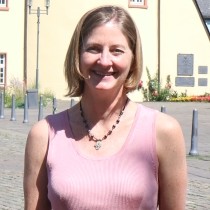
Montana State University, United
States
Host at the University of Siegen:
Jun.-Prof. Dr. Kerstin Ettl
Junior Professor of Entrepreneurial Diversity & SME
Management
I am a Professor of Management at Montana State University, Bozeman, United States.
- Women entrepreneurs, collaborative processes for innovation, organisational change, and participatory modeling for decision making and collective impact.
I came to Siegen to work with Jun.-Prof. Dr. Ettl on our joint project, which looks at how entrepreneurs define success, as well as the reasons for them becoming entrepreneurs in the first place.
I have known Jun.-Prof. Dr. Ettl since I attended a conference in 2013, we got talking and recognised that we were both interested in women entrepreneurship. Since then we have worked together on research papers and visited one another in Montana and Siegen.
We are currently focused on our current paper as it goes through the review process. Once we are finished with that, then we are considering a new paper in which we model the theoretical construct which emerged from our previous paper.
I really like the Siegerland, I like how green it is, I love the hills, the shops, the people, and the delicious cheeses!
Asst. Prof. Dr.-Ing. Ahmad Kamal Nasir
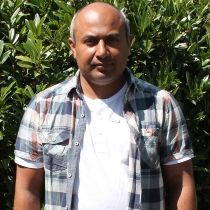
Lahore University of Management
Sciences, Pakistan
Host at the University of Siegen:
Univ.-Prof. Dr.-Ing. Dr. h.c. Hubert Roth
Chair of Automatic Control Engineering
I am an Assistant Professor of electrical engineering and the director of the Engineering Laboratory at the Lahore University of Management Sciences (LUMS) in Pakistan.
My field of research is Mobile Robotics, Embedded and Control Systems, Computer Vision, and Remote Sensing.
I came to Siegen to work on a new DAAD research project proposal and on a research article related to our recently concluded project “Green Drone: Deforestation and Forest Degradation Estimation using an Unmanned Aerial Vehicle” project, which is a joint project between the University and LUMS funded by the DAAD for two years. For each of these years we planned to undertake a research visit to one another’s institutions. Therefore I was able to come to Siegen for a month each year to work on this project.
In our Green Drone project we use Unmanned Aerial Vehicles (UAV) to survey a forest area, and then using acquired aerial imagery to create a 3D map. Using this map we are able to count trees, estimate their heights, tree-crown diameter and forest density. Together with some statistical parameters of the data we are able to estimate carbon present in the forest. This data is very important for quantifying the environmental impact of the forest, and for carbon credits.
Our cooperation is valuable for both sides because the University of Siegen can provide academic support in creating 3D maps from images, as well as expertise in path planning. Path planning is very important because UAVs are not flying over a flat surface, but over natural terrain, including mountains. What our side was able to offer were algorithms for detecting trees in 3D maps of the forest, as well as our local perspective. Because we are based in Pakistan we are able to meet with government departments and to build a good working relationship with them.
It started in 2007 when I got a scholarship from my government for a Master’s degree which would then lead to a PhD I chose to come to Germany because I felt it to be more technologically advanced.
My PhD at the University of Siegen was concentrated on cooperative localisation and mapping of heterogeneous mobile robots, such as ground as well as UAVs. In order to navigate in an unknown environment, these robots need environment map, but if the environment is unknown then of course such map does not already exist, therefore, first they need to jointly create a map of the environment. In essence this is like a chicken and egg scenario.
One of the goals for this year’s research visit was for us to submit another joint proposal. If we come across some other opportunities where we could get some joint funding then we would be more than happy to take them in order to make this cooperation sustainable.
My first winter here did prove to be a little bit challenging for me because I come from a warm climate, but I got used to it. When I came back, after having previously spent six and a half years in Siegen, I felt very comfortable because everything feels so familiar to me, and I was also overjoyed to meet my old friends again.
Prof. Dr. Alexandre Avelino Giffoni Jr.
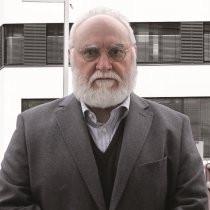
University of Rio Verde, Brazil
Host at the University of Siegen: em.
Univ.-Prof. Dr. Bernd Fichtner
Chair of General Pedagogy
I have been a Professor of higher education and scientific methodologies at the University of Rio Verde - UniRV, State of Goiás, Brazil since 1992. I have been working with qualitative interventionist research in teaching and learning processes in schools and other institutions. As part of my position, I act as the coordinator of the International Relations and Mobility Office, where I develop binational programs of research, international congresses, seminars, et cetera.
I am working on my post-doctorate at the University of Siegen with a project that aims to build and manage an institution connected with my university for the development of children with special needs and which provides orientation for their parents and educators.
My research is focused on didactic-pedagogic interventions in schools and institutions of the third sector that work with children’s development within communities and people in difficult social situations in Brazil. I am also researching the internationalisation and mobility of students, teachers and researchers in a globalised planet.
My last visit to Siegen in 2017 aimed to strengthen the relationship between the University of Siegen and the University of Rio Verde (UniRV) in the areas of international mobility and research cooperation. This visit resulted in the common agreement of international cooperation between the two Universities and was the beginning of my post-doctorate studies at the University of Siegen this year.
I visited the Haus Früher Hilfen - HFH, directed by Dr. Wolfgang Wörster and located in the Oberbergischer Kreis, Germany, last year, together with Prof. Dr. Fichtner (University of Siegen) and Professor Sebastião L. Pereira, the Rector of UniRV. Impressed by the interdisciplinary work of this institution, with its high social outreach, our rector decided that the UniRV could build an institute inspired by the guidance of HFH.
This institute will be a transdisciplinary and multidisciplinary educational-therapeutic unit, which will work for the development of children with special needs, and give guidance to their families and caregivers. The UniRV, the Rio Verde City Hall and the City Council joined forces to build the HFH in our city, with the full support of the Mayor of Rio Verde.
The construction and maintenance of the Institute I mentioned above will be under the responsibility of the UniRV, which will use it to carry out research, postgraduate courses, multiprofessional training of students and professors of both universities, exchange and international mobility. My duty here at the University of Siegen is to develop and manage the whole project with my colleagues: Professors Fichtner, Exner and Dr. Wörster.
I already feel at home in the beautiful Siegerland with its lovely people. I love walking through the trails at the mountains and forests of Hilchenbach, where I lived with the kind company of my friends, Prof. Dr. Fichtner and his wife Maria Benites. I am especially thankful to Nina Fenn and all the staff of the International Office: they have made me feel at home since the first day I arrived in this wonderful city.
Dr. Mohamed Amine Masmoudi
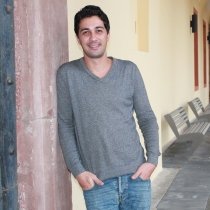
Geneva School of Business
Administration, Switzerland
Host at the University of Siegen:
Prof. Dr. Erwin Pesch
Chair of Management Information Science
I am an Assistant Researcher at the University of Siegen, Faculty III, School of Economic Disciplines. Before I came to Siegen, I was working at the Geneva School of Business Administration, Switzerland as a recipient of the Swiss Government Excellence Scholarship, originally I am from Tunisia.
- Transportation, (hybrid) Metaheuristics, Operation Research, Logistic, Vehicle Routing.
Start of a new collaboration in the field of transportation and the development of a research proposal to be submitted to the German Research Foundation and the Swiss National Science Foundation. Of course, I wanted to meet my colleagues and friends of the team of Prof. Dr. Pesch.
I worked with Prof. Dr. Pesch on two papers that are submitted in top journals.
My future project is to develop and solve a new problem arise in the field of transportation of peoples and parcels using a fleet of electric taxis in Deutsche Bahn.
The University Siegen has a fantastic atmosphere of collaboration where I discovered an excellent team. The university (faculty) provide all the necessary types of equipment needed for our research.
Assoc. Prof. Dr. Korakoch Attaviriyanupap
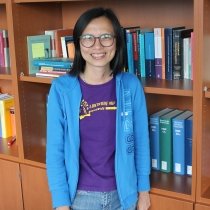
Silpakorn University, Thailand
Host at the University of Siegen:
Univ.-Prof. Dr. Petra M. Vogel
Chair of German Linguistics
I am an Associate Professor at the German Department at Silpakorn University in Nakhon Pathom, Thailand.
Much of my research is on linguistic analyses of various aspects of the German and Thai languages, as well as the differences and similarities between them.
During my last visit to Siegen I worked together with Prof. Dr. Vogel and her research assistant, Dr. Baumann, on a joint publication titled “From X to X: Syntactic Reduplication in German.” I also worked on my own research project “The Thai morpheme hâj and its equivalents in German.“
I originally met Prof. Dr. Vogel in Switzerland, while we were both at the University of Bern. We were both conducting research on similar topics, but from slightly different perspectives, so we recognised the potential for future scientific cooperation. After I returned to Thailand, I decided that I would like to have the opportunity to discuss my research with other German linguists, there are unfortunately not so many in Thailand, and I asked Prof. Dr. Vogel if I could conduct a research visit with her. She had then accepted a position at the University of Siegen, so I went there for the very first time. I have come back many times since then.
I am looking forward to coming back to Siegen, and to continue working with Prof. Dr. Vogel on our joint research papers. Prof. Dr. Vogel and Dr. Baumann are hoping to come to Thailand to visit my home institution in 2019.
I have been to Siegen eight times already, so this city is starting to feel like a second home to me.
Prof. Dr. András Bátkai
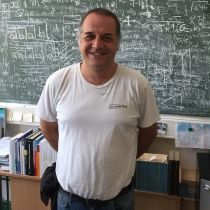
University College of Teacher
Education Vorarlberg, Austria
Host at the University of Siegen:
Univ.-Prof. Dr. Gregor Nickel
Functional Analysis and Philosophy of Mathematics
I am a Professor of Mathematics at University College of Teacher Education Vorarlberg (Pädagogische Hochschule Vorarlberg) in Feldkirch, Austria. Originally I am from Hungary.
- Applied functional analysis, history of mathematics.
To work on the teaching of history and philosophy of mathematics in the teacher training programmes. It is important for future teachers to learn about the history and philosophy of their subject to understand how ideas developed and to see that mathematics is a human product which developed over time.
We co-authored several mathematical publications. The collaboration started when I was a Humboldt Fellow visiting my host, Prof. Dr. Nickel, and now we are working on a new project.
My host will visit me in Vorarlberg during the academic Year 2018/19, we plan to finish a joint publication and incorporate the new ideas in our teaching practice.
I like the small town of Siegen, the hills, the walks through the forest to the Emmy-Noether-Campus. It is a great place to work.
Dr. Efua Esaaba Agyire-Tettey
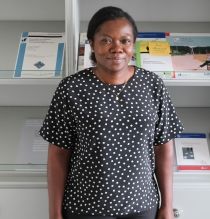
University of Ghana, Ghana
Host at the University of Siegen:
Prof. Dr. Johannes Schädler
Professor of Social Education and Social Work
I am currently a lecturer at the University of Ghana in Accra, Ghana. I lecture in social work at the Department of Social Work and Social Issues in Environmental Sanitation at the Institute for Environment and Sanitation Studies. I also provide advisory services to individuals on general social issues. I have been part of the Centre for Environmental Research Policy Analysis (CERPA) as a senior research advisor.
My research is specialised in disability Issues, particularly the welfare of children with disabilities, social protection, family welfare, human rights, and violence and conflict management. I also have experience and interest in gender issues and the general discipline of humanities. I also try to actively collaborate with researchers in other disciplines. My current research project includes inclusive design of local communities through new forms of social planning: pilot project at Suhum municipality, eastern region, Ghana, host country views on short-term health volunteer programmes and exploring the experiences of parents with children with disabilities.
I had a joint project with my supervisor, funded by Engagement Global North-Rhine-Westphalia. I visited Siegen to discuss future research and to present the final report of the joint project between Centre for Planning and Evaluation of Social Services, University of Siegen, the Department of Social Work, University of Ghana, Suhum Municipality Assembly, and the City of Siegen. Besides discussing the joint research project, I also gave a lecture on the role of social work in Ghana. In addition, my previous visit to Siegen was to participate in an international study week where I had the opportunity to present papers on child welfare and protection in Ghana: developing of structure between old tradition and new demands of contemporary society, social protection in Ghana and rethinking disability rights. It was an interesting experience interacting with students and faculty.
I have had a great relationship with Prof. Dr. Schädler of University of Siegen. He has been my host every time I visited Siegen and as a result the Universities of Siegen and Ghana have a great research collaboration.
I am considering further cooperation with Prof. Dr. Schädler by developing our current project further (includes inclusive design of local communities through new forms of social planning – pilot project at Suhum municipality, eastern region, Ghana), adapting it and replicating it in other districts in Ghana and to develop a manual for inclusive communities in Ghana. Also we are considering a project on perspectives of failed asylum seekers in NRW, Germany who have returned to Ghana.
The environment in Siegen is conducive for learning, the faculty provided facilities available to all category of learners. The university is multicultural and the students are very receptive which helps to adjust to a new environment. The city is small, very cold at winter and quiet particularly during vacation, but it keeps improving every time I visit. The environment is beautiful, especially during the spring. I value my time in Siegen, particularly my research collaboration with Prof. Dr. Schädler.
Prof. Samuel Adler
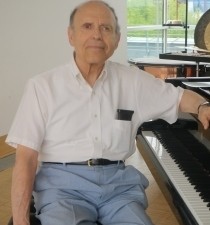
University of Rochester, United
States
Host at the University of Siegen:
Univ.-Prof. Martin Herchenröder
Chair of Music Theory
I am a Professor Emeritus at the University of Rochester’s Eastman School of Music and the Juilliard School in New York, United States. I retired from Eastman in 1995 and the Juilliard School in 2016, but I think it’s better to stay active.
I have been composing music for pretty much my entire life. I have composed over 400 published works. I was very lucky to have had so many wonderful opportunities to learn from such esteemed composers as Paul Hindemith, Walter Piston, and Aaron Copland.
During my last visit to Siegen, my wife and I ran a workshop for music students. I advised them on composition, and my wife conducting. Then in the evening the students got to showcase their results in a concert.
I first met Prof. Herchenröder at Eastman in 2008. We got talking, and I mentioned that I teach at the Freie Universität Berlin every summer, so Prof. Herchenröder said, why don’t you come along to Siegen at around the same time? So the next year, I attended the University of Siegen’s Alumni weekend. Since then I have been coming back to Siegen every couple of years. Over the years we have held various workshops and concerts in cooperation with organisations such as the Amerikahaus in Cologne, the German-American Society of Siegen-Wittgenstein, and the Nikolai Kirche in Siegen.
I’m 90 years old, so I try not to make too many plans. But Prof. Herchenröder and I have some more exciting projects planned for the next time I come to Siegen.
This city has everything one needs, it has excellent restaurants and it has wonderful surroundings. I always enjoy coming here, it’s a little difficult to get here from Berlin but we try our best.
Asst. Prof. Dr.-Ing. Thomas Wahl
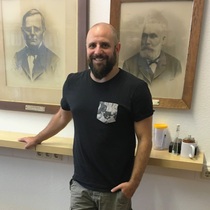
University of Central Florida,
United States
Host at the University of Siegen:
Univ.-Prof. Dr.-Ing. Jürgen Jensen
Chair of Hydraulic and Coastal Engineering
Dr.-Ing. Arne Arns
Senior Researcher, Research Institute for Water and
Environment
I currently work at the University of Central Florida (UCF) in Orlando, Florida, United States, as an Assistant Professor. I am based at the Civil, Environmental, and Construction Engineering Department, the National Center for Integrated Coastal Research (UCF Coastal), and I’m also a core member of the Sustainable Coastal Systems Cluster.
My research is concentrated on the coast. It is a mixture between coastal engineering and coastal oceanography. We look at many different things which are related to the coast including storm surges, flood risk, and of course sea level rise. Florida is a good place for coastal research, not only because it is the sunshine state and has beautiful beaches, but also because it’s often referred to as ground zero for sea level rise impacts. The long coastline means that many people and assets are exposed to storm surges and flooding. The City of Miami experiences minor flooding up to 50 times per year, and sea level rise will lead to a further increase in flood risk. It’s therefore particularly important for institutions in the state of Florida, and other coastal regions around the world to try to understand how the ocean is changing and how we can adapt to it.
In our field of research it is particularly important to establish and to maintain international collaborations because the ocean is something which is shared by all of humanity, and its health ultimately affects us all. Collaboration with my former colleagues in Siegen was a natural fit because we already have a close working relationship and we have previously worked on numerous joint publications together. During my most recent research visit to Siegen I was working together with Prof. Dr.-Ing. Jensen and Dr.-Ing. Arns on developing new techniques to analyse tidal and storm surge data, which we will write about in our next joint paper.
I grew up in Siegen, and received my diploma and PhD at the University of Siegen. Over time we built a close working relationship, and I am very happy to be able to continue to cooperate with the growing research group at the Research Institute for Water and Environment. While my research is more focused on the Gulf of Mexico and North Atlantic, and theirs on the Baltic and North seas, the methods we develop and use are often transferable to different regions across the world.
We were previously able to receive some money from the German Academic Exchange Service (DAAD) for students and postdocs from Siegen to come and work with me in Florida. Dr.-Ing. Arns and Prof. Dr.-Ing. Jensen were both there for a couple of weeks, and we also had a PhD student, Marius Ulm, complete his Master’s thesis there. We are hoping to receive some more funding to allow some more students from Siegen to conduct coastal research with me in Orlando for a few weeks. We also have many ideas for further joint publications which we have been discussing for the past few weeks.
I still manage to come back to Siegen every now and again, and I have to say that it has much improved in comparison with previous years. I particularly like what has been done to the river Sieg in the city center, it looks so much nicer than before. This city will always be “home” to me.
Prof. Dr. Hans-Peter A. Künzi
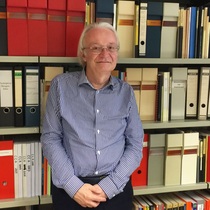
University of Cape Town, South
Africa
Host at the University of Siegen:
Univ.-Prof. Dr. Dieter Spreen
Chair of Mathematical Logics and Theoretical Computer
Science
I am a full Professor at the Department of Mathematics and Applied Mathematics of the University of Cape Town, in Rondebosch, South Africa.
- Topology, orders, categories, combinatorics and their applications in analysis and algebra; focus on asymmetric topology.
A central concept of applied mathematics is the notion of a metric space, that is, a set of points equipped with a symmetric real-valued distance function. The motivation for such investigations originates for instance in planar geometry. If however one models surfaces with hills and valleys and one plans to measure the distance between two points A and B by the energy needed to move from A to B, then the symmetry condition in general is no longer satisfied. This variant leads to the weaker concept of a quasi-metric. One advantage of this generalisation is that now also applications are possible in the field of computer science. In this area in particular the weighted quasi-metrics are of interest, which often appear as partial metrics.
An interesting problem is to measure the degree of symmetry of a given distance function d. In order to treat this question, it is natural to determine the distance of d to some symmetrisation of d. To this end there exist various approaches in the mathematical literature, which we have studied and compared during my stay. This led for instance to a cooperation with a research group form Hacettepe University in Ankara. Towards the end of my visit I gave a talk about generalised metrics at the conference “International Conference on Topology and its Applications” in Nafpaktos, Greece.
As in a previous visit to Siegen, besides my research activities, I did in Siegen some teaching for Masters students about the theory of graphs. In this way I could also participate in several meetings of the Department of Mathematics in Siegen. This offered me the opportunity to make comparisons between administrative work done in Siegen and in Cape Town. Furthermore I had many interesting discussions with the students and a student tutor associated with my course.
My host, Prof. Dr. Spreen, in Siegen and I have known each other for many years and always appreciate our joint scientific discussions. We had many opportunities for such discussions during my recent visit, as in the past during our regular visits to Cape Town (Siegen, respectively). For instance I had already spent several months of my sabbatical of 2011 at the University of Siegen.
It is planned that the existing fruitful collaboration between the Universities of Cape Town and Siegen will be continued. During my stay in Siegen Prof. Dr. Spreen and I discussed how the funding of future exchange visits could be secured in the years to come.
After my usual work in Cape Town, I always like to return to the town of Siegen, since over the years I have always found it to be a relatively quiet place, which has clearly furthered my mathematical research.
Prof. Dr.-Ing. Martin Drahanský
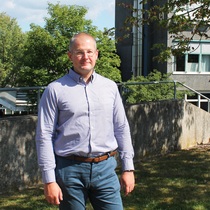
Brno University of Technology,
Czech Republic
Host at the University of Siegen:
Univ.-Prof. Dr.-Ing. PD Kerstin Weinberg
Chair of Solid Mechanics
I am the head of research group STRaDe at the Faculty of Information Technology, Brno University of Technology, Czech Republic. My current position is full Professor.
The group (and my own field of research) is strongly oriented on biometric systems and processing of image and videosequence data. However we deal with embedded systems as well, because they are needed for intelligent solutions in the area of image and videosequence data processing. We have running collaborations with industrial partners, criminal police and military departments
Start of a new collaboration in the area of videosequence data processing from a high-speed camera. Of course, I wanted to meet my colleagues and friends from a long time ago. The last purpose was to refresh my memories to Siegen and city surroundings.
Previously I worked in the Department of Measurement Technology (Institut für Meßtechnik) under the supervision of Prof. Dr.-Ing. Bonfig. He is now retired, and some of his colleagues passed away, so I am now in contact with Dr.-Ing. Nötzel, who moved to the Department of Engineering - Institute of Mechanics and Control Technology - Mechatronics (Department of Maschinenbau – Institut für Mechanik und Regelungstechnik – Mechatronik). He works under the supervision of Prof. Dr.-Ing. PD Weinberg.
As mentioned before, we would like to collaborate in the area of videosequence data processing from a high-speed camera. This data comes from experiments in solid mechanics.
From the past I have only a great experience and impression of Siegen in general. The university is multicultural and opens many possibilities not only for students, but for researchers as well. The city is quiet, but not small. The surrounding nature is wonderful.
Assoc. Prof. Dr. Seyed Mohammadamin Emami
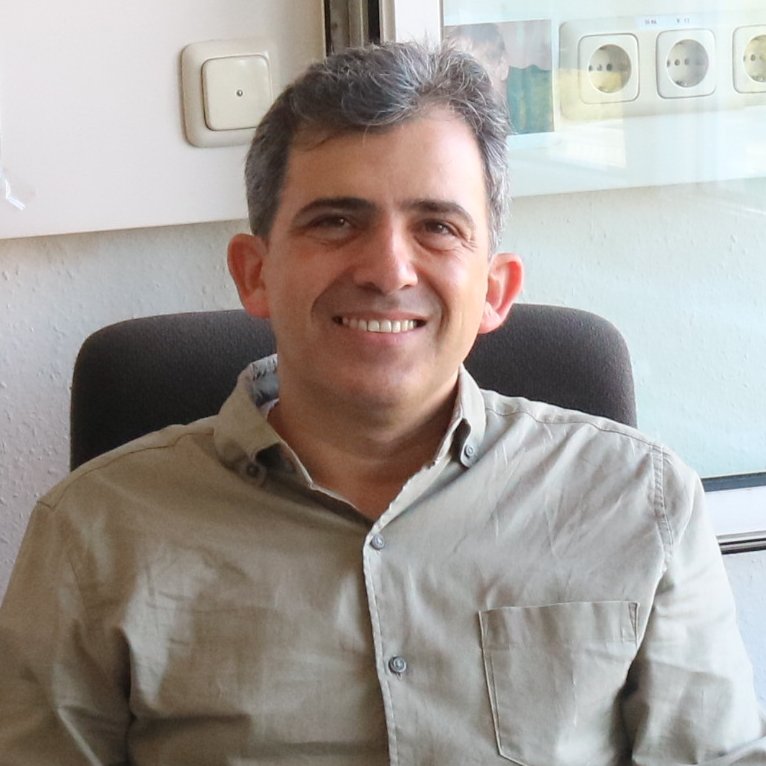
Isfahan University of Art, Iran
Host at the University of Siegen:
Univ.-Prof. Dr. Reinhard H. F. Trettin
Chair of Building and Materials Chemistry
I am an Associate Professor in Mineralogy, Crystallography, and Archaeometallurgy at the Isfahan University of Art in Iran.
My main field of research is archaeometry, which combines the study of archaeology with other scientific disciplines, such as material science. This combination is fantastic because it enables you to combine scientific analysis with sociological knowledge to discover more about how people lived in the past. How they produced materials, how they lived et cetera.
I have been coming to Siegen to study, work and to cooperate for the past 14 years, during these research visits, we have been researching ceramics. We have been focused on 3 particular aspects, raw material usage, manufacturing process and decoration of the ceramics. At first glance this can seem rather simple, but it requires a lot of care to correctly interpret the scientific research and the material characteristics, because often you will only have a small piece of ceramic from which to draw your conclusions. Through careful consideration we can discover many insights into the past, such as the manufacturing process, the kiln process, and how ceramic production developed over time.
We have been investigating samples from the Middle East, from Iran and Iraq. It was fascinating to find out more about the relationship between different civilisations according to the material developments. While there are currently national borders between Iran and Iraq, thousands of years ago there were nations which cut across those borders, such as Mesopotamia & Babylonia, in our research we mainly focussed on Mesopotamian ceramics. More recently we have had some samples from the Roman theatre in Mainz, which is another exciting direction in which we can take our research.
When I first came to Germany I studied Mineralogy at Mainz University in 1998. Afterwards I worked in the Max Planck Institute as a scientific researcher. It was there that I first worked with Prof. Dr. Trettin. When he decided to come to Siegen, I followed him because I wanted to write my PhD under him in the field of Archeaometry. Since finishing my PhD I have been returning to Siegen on a regular basis to continue my research.
Of course nobody can say with 100% certainty what will happen in future. I intend on coming back to Siegen once again, however Prof. Dr. Trettin will retire soon, so that might make it difficult. I am very grateful for all of the kindness and help given to me by him and all of my colleagues here.
The University of Siegen has a fantastic atmosphere of collaboration, we worked together with scientists from many different disciplines during our research, and we could always have interesting discussion with our colleagues, which would sometimes lead to new and interesting areas. The University is also able to provide all of the equipment needed for our scientific analysis. While the City of Siegen does not have so many exciting things to see compared with larger cities, it is noticeably improving very time I come back, and I hope to come back again soon.
Prof. Dr. Page Laws
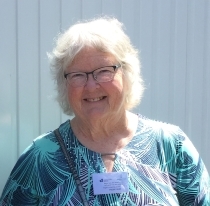
Norfolk State University, United
States
Host at the University of Siegen:
Univ.-Prof. Dr. Daniel Stein
Chair of North American Literary and Cultural Studies
I serve as Professor of English and Dean of the R. C. Nusbaum Honors College at Norfolk State University (NSU) in Norfolk, Virginia, United States. I have worked at NSU for 31 years. NSU is a historically Black University that was founded in 1935, in the midst of the Great Depression, to offer Black students in Tidewater, Virginia (our region’s name at that time) a chance at higher education.
My PhD is in Comparative Literature (Yale 1979), with emphases in French/Francophone, German and English/Anglophone literature. I am particularly interested in European and African views of America, and much of my work has focused on modern and post-modern fiction, drama and film. I do Cultural Studies, often with a transnational emphasis.
My most recent visit to University of Siegen was for a symposium entitled “Migration and Immigration in Europe and the Americas.” I was accompanied by five NSU Honors faculty colleagues who presented their work at the symposium and enjoyed hearing papers by Siegen professors. Prof. Dr. Stein was the co-organiser of the symposium. My NSU Honors faculty colleague Dr. Manalang also visited Cologne and Siegen this past summer to continue her research on the religious views of millennial immigrants to Germany.
We have a long-standing relationship begun almost a decade ago by Dr. Waegner, now retired from the Department of English/American Studies at the University of Siegen. Dr. Waegner and I hosted a faculty exchange between NSU and Siegen, also on the theme of immigration, back around 2008. Then Prof. Dr. Stein took up the role of facilitator, helping arrange for a memorandum of understanding between our two institutions.
We hope that our “Mother(s) of Exiles” project – comparing attitudes towards immigration in Germany and the US – will result in a second book within this upcoming academic year. We are also expecting half a dozen Siegen professors or graduate students to visit us here in Virginia for the 2019 conference commemorating the 400th anniversary of Africans landing in Anglo-America.
SSiegen was unusually hot during our early June visit, but my colleagues and I truly relished the (human) warmth of our very cordial reception!
Prof. Dr. Andonaq Londo
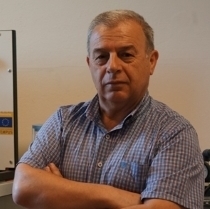
Polytechnic University of
Tirana, Albania
Host at the University of Siegen:
Univ.-Prof. Dr.-Ing. M.Sc. Thomas Carolus
Chair of Hydrokinetic Flow Machines
I currently hold the title of full Professor at the energy department of the Polytechnic University of Tirana, Albania. I have held this title since 1980. There I teach Fluid Mechanics, Fluid Machinery, Internal Combustion Engines, and Fluid Power. I’m leader of the scientific research group at Energy department for the above scientific field. I have served for three terms as Dean of my faculty. From 2003-2008 I have served as a director of the scientific research office at the Polytechnic University of Tirana. From 2004-2012 I was chairman of the German –Albanian Cultural Association “Robert Schwarz”.
- Turbomachinery, Energy efficiency, Fluid Power, Fluid Mechanics, nternal Combustion Engines, Fluid Power, Renewable energy
My last visit to the University of Siegen was in July 2017. Once again, the Department of Energy at the Polytechnic University of Tirana organised, under the direction of the University of Siegen, a summer school in the field of energy and energy efficiency. During the summer school, Prof. Dr.-Ing. Carolus met about 40 researchers and students from Germany, Albania, the United States, and China over three days. Students and young researchers from these countries discussed their work in the fields of turbine power and energy efficiency. This activity was funded by the Erasmus+ program and organised by Prof. Dr.-Ing. Carolus. Mechanical engineering students from Siegen and Albania, who spent the summer semester at the University of Siegen on the Erasmus program, shared their ideas through lectures and poster presentations and discussed current energy issues. The first “Energy” summer school took place in Tirana in 2012. At that time everyone involved had great interest in repeating this success. We were able to do so, this time in Siegen, in July 2017. A continuation of this technical exchange on the international level would be most desirable for everyone involved, particularly given the international relevance of renewable energy.
I have spent much time in the University of Siegen in cooperation with Prof. Dr.-Ing. Carolus. My first visit was in November 1996 for two months after I had received a DAAD scholarship to work with at the University of Siegen’s Institute for Fluid und Thermodynamics. In 1997 I became a member of the scientific research group lead by Prof. Dr.-Ing. Carolus. I then worked in this team for more one year. Since my first time in Siegen, I have gained exchange experience not only in teaching, but also in scientific research with Prof. Dr.-Ing. Carolus and his group. This was the greatest experience I have had while working with professors and institutions outside of Albania. Prof. Dr.-Ing. Carolus has also spent much time at the Polytechnic University of Tirana. I would like to thank him for the great help given at our University in the preparation of new mechanical engineering teaching plans, which were needed for the restructuring of our higher education system in accordance with the Bologna process. Meanwhile, I would like to further emphasize his great work in supervising the work of diplomas of many Albanian students, who stayed for approximately 6 months at the University of Siegen, near the Institute for Fluid und Thermodynamics. Between 2001 and 2016, 12 Albanian mechanical engineering students have completed a Master's degree under supervision of Prof. Dr.-Ing. Carolus.
Our future plans naturally follow from our research efforts in the past and present in the field of renewable energy, we will continue to write joint publications in future years. I and my assistant Ardit Gjeta recently met with Prof. Dr.-Ing. Carolus in Darmstadt in April 2018 at the International Conference “ On Fan Noise , Aerodynamics, Applications and systems “ where we presented a paper together. I hope that our common research work will continue not just through continued joint participation in EU and German-funded research projects, but also in joint research in areas of mutual interest. Meanwhile, I hope that the exchange of students, academic staff and administrative staff will continue to grow with the University of Siegen.
I consider Siegen to be my second city, after Tirana, where I grew up and became an engineer. There is an excellent climate of cooperation at the Chair of Hydrokinetic Flow Machines, under the lead of the erudite Prof. Dr.-Ing. Thomas Carolus. I found the people of Siegen to be polite, warm, and always willing to help guests overcome any issues they might have during their visit. For me and my family, Siegen, and its University have become a very important part of our lives since we stayed there from 1997-1998. The fact that I had so many wonderful experiences, but now I also miss my partners at the institute of Siegen. I miss Siegen's beer, fresh summer, spring flowers of many colors, and above all, my friends. I hope to one day return for another visit to Siegen.
Prof. Dr. Jin Zhao
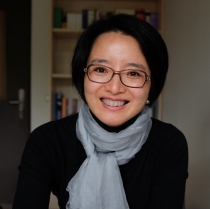
Tongji University, China
Host at the University of Siegen:
Univ.-Prof. Dr. Stephan Habscheid
Chair of German Applied Linguistics
I am a Professor of Germanistische Linguistik (German Language Linguistics) at Tongji University, Shanghai, China.
- Linguistics
- German as a foreign language
- Intercultural communication
- Philosophy of language
The purpose of my research visit is to make new projects at the background of a long-term research collaboration between the University of Siegen, Germany, and Tongji University, China. The main research objective is to research the biographies of Wilhelm von Humboldt and his philosophy of language.
I was previously here as a Diesterweg research fellow of FIGS (research institute for humanities and social science) in 2012 and within the bounds of the Friedrich Wilhelm Bessel Research Award of the Humboldt Foundation in 2013 at the Department of German at the University of Siegen, hosted by Prof. Dr. Habscheid.
Our future plans follow from our research efforts in the field of cultural analysis language and medium linguistics. We have organised a Humboldt research workshop in the October 2017 and on this basis we are planning to edit a Humboldt issue of the Zeitschrift für Literaturwissenschaft und Linguistik (Magazine for literary science and linguistics).
Compared to Shanghai, Siegen is an idyllic city. The cakes from Naschwerk are the best in Germany. Siegen is a city with a very good quality of life.
Dr. Olga Tsurtsumia
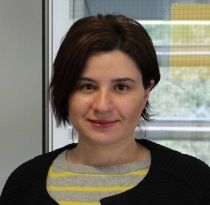
Georgian Technical University,
Georgia
Host at the University of Siegen:
Univ.-Prof. Dr.-Ing. Hans-Jürgen Christ
Chair of Materials Science and Testing
Priv. Doz. Dr.-Ing. habil. Bronislava Gorr
Senior Researcher
I have held a permanent position as a senior scientific researcher at the Republic Center for Structure Research (RCSR) of the Georgian Technical University (GTU) in Tbilisi, Georgia since 2003. The main research field of the RCSR is the investigation of micro- and nano-structures of materials, their properties, peculiarities and behaviour in different environments. My responsibilities are particularly related to studying the behaviour of high temperature corrosion/oxidation resistant materials, development of heat resistant coatings and new technologies related to these areas.
Materials Science; High temperature alloys and coatings
I have collaborated with the University of Siegen’s Chair of Materials Science and Testing for many years. My last visit there was for one week in April 2018, during which I held an intense schedule of meetings, scientific-research, as well as social activities to celebrate the chair’s 25th anniversary. This has allowed a good opportunity for an exchange of ideas, experience and information on the newest high temperature material related studies and projects going on in our two research groups (GTU and University of Siegen). These exchanges occurred during private conversations, official meetings, and seminars given to an auditorium consisting of professors, lecturers, and students as well as the technical staff of the department.
Collaboration between our two groups has occurred for about ten years. I met one of my co-hosts, Priv. Doz. Dr.-Ing. habil. Gorr from University of Siegen, at an international conference in France where we discussed our topics of research and found lots of common areas of interest, we then began to plan our further collaboration. Since then I have visited the chair of materials science lead by Prof. Dr.-Ing. Christ many times in the scopes of projects funded by the AvH (Alexander von Humboldt) foundation or the DAAD (German academic exchange service). Besides the exchange visits my hosts and I also regularly meet at different international conferences dedicated to the topics of materials science.
Since our collaboration with the Materials Science chair of University of Siegen has always been very fruitful, we plan to continue this also in future. We are always up for new challenges; such as participating in both the large international and multi-partner research projects as well as the smaller ones.
I consider Germany to be my second motherland because I have spent many years of my life in this country. I was honoured to work with many distinguished German (as well as international) scientists in the Forschungszentrum Jülich, BAM (Federal Institute for Materials Research and Testing) and of course the University of Siegen. I am always happy to come to Germany and especially to Siegen because there are so many colleagues and friends who make this place special for me.
Dr. Nowsheen Goonoo
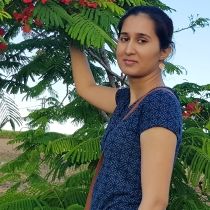
University of Mauritius,
Mauritius
Host at the University of Siegen:
Univ.-Prof. Dr. Holger Schönherr
Chair of Physical Chemistry I
I am a postdoctoral researcher currently working at the Biomaterials, Drug Delivery & Nanotechnology Unit, Centre for Biomedical and Biomaterials Research (CBBR), University of Mauritius in Réduit, Mauritius.
High end biomedical applications of naturally-derived polysaccharides, for example seaweeds and Aloe vera.
I first met Prof. Dr. Schönherr in 2013, at a Polychar Conference in Gwangju, Republic of Korea. We began to talk about our work and we found out that there was much to be gained by conducting research together. Since then there has been a close cooperation between our research groups. The University of Siegen provides expertise in cell work and also allows us access to certain equipment which is not yet available in Mauritius.
Whereas myself and the CBBR can offer extensive experience and expertise into the scientific applications of seaweed and Aloe vera, as they are native to Mauritius and the surrounding ecosystem. It is noteworthy to mention that I spent one year (2016 – 2017) working in Prof. Dr. Schönherr’s group as a Georg Forster Postdoctoral Researcher (awarded by the Alexander von Humboldt Foundation). The research stay was very fruitful and led to several joint publications with Prof. Dr. Schönherr but also with other departments of the University of Siegen.
For us it is most important to ensure that the current research is complete before we begin anything new. However it is never possible to know exactly how much longer the current research will take; the results can lead us in many different directions. We will continue to cooperate closely to test the effectiveness of different substrates with varying fiber topographies in capturing cancer cells. Thankfully it is relatively easy to share samples between Siegen and Mauritius by mail, and modern technology allows us to always stay in close contact.
I found the working group of Prof. Dr. Schönherr to be warm and welcoming, they really made me feel at home very quickly. Siegen itself is very nice, and it is also not so big, coming from a small island I found Siegen easy to adjust to, except for the weather of course!
Prof. Dr. Seung Wook Jung
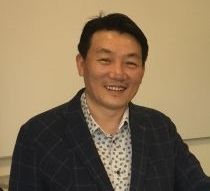
Konyang University, Republic of
Korea
Host at the University of Siegen:
Univ.-Prof. Dr. Christoph Ruland
Chair of Data Cummunications Systems
I am a Professor at the Department of Cyber Security Engineering at Konyang University in Nonsan, Republic of Korea.
- My research specialty is in blockchains, which is a specialised and decentralised way of recording economic transactions. This technology has many applications, for example it forms the basis for cryptocurrencies. My current research looks at how to use blockchains in smart energy grids. Smart energy grids also have many different uses, they can for example, make it easier for consumers to sell any electricity they generate back into the grid.
I came to Germany in order to cooperate on a project called “smart grid blockchain for end-to-end authentication and logging“ with Prof. Dr. Ruland at the University of Siegen.
I studied my PhD at the University of Siegen a few years ago, Prof. Dr. Ruland was my supervisor.
Prof. Dr. Ruland proposed a project about blockchains for smart grids to the Pajako programme (a German Mini-stry of Foreign Affairs initiative to foster partnerships with Japan and Korea). We have just made a memorandum of understanding (MOU) between the Universities of Siegen and Konyang to facilitate tighter cooperation in future. We will regularly visit both Universities to conduct this joint international project. By combining Prof. Dr. Ruland’s expertise in smartgrids with mine in blockchains, we can create research that is greater than the sum of its parts.
Siegen is a quiet and green city. I usually live in a larger metropolitan area so I find Siegen to be an easy place to relax because of the fresh air.
Prof. Dr. Jian Xiong
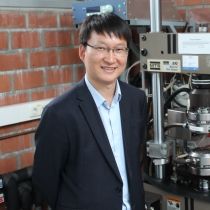
Harbin Institute of Technology,
China
Host at the University of Siegen:
Univ.-Prof. Dr.-Ing. Hans-Jürgen Christ
Chair of Materials Science and Testing
I currently hold the title of a full Professor, I am also a Principal Research Scientist at the group of Mechanics of Lightweight Composite Materials and Structures, Center for Composite Materials and Structures, at the Harbin Institute of Technology in Harbin, China.
- Mechanics of Lightweight Composite Materials and Structure (Composite Materials, Cellular Materials, Porous Materials, Biomaterials, Sandwich Panels, Lightweight Structures, Multifunctional Structures).
The purpose of my research visits is to set up a long-term research collaboration between the University of Siegen, Germany, and the Harbin Institute of Technology, China. The main research objective is to present the results of combining experimental, numerical and analytical studies to investigate the micro-structures and mechanical properties of the cellular structures in the mammal skull.
The results of our research are expected to be useful for understanding the mechanical properties and damage mechanisms of cellular structures in the mammal skull and these fascinating features serve as suggestions to researchers to design or fabricate new bio-inspired materials to improve our lives.
I was previously a Humboldt Research Fellow at the Institut für Werkstofftechnik, University of Siegen from March, 2015 to August, 2016. The time before that was from September to December, 2013, when I was a visiting DAAD scholar. Prof. Dr.-Ing. Christ was my host during both of these visits. I have joint research and publications with Prof. Dr.-Ing. Christ and Dr.-Ing. Ohrndorf which present a systematic investigation on the failure mechanism and energy absorption of skull cellular bones under low- and medium-velocity impact loadings.
Our future plans naturally follow from our research efforts in the past and present in the field of lightweight cellular bones materials. We are planning to prepare a research proposal for the NSFC-DFG (Deutsche Forschungsgemeinschaft and National Natural Science Foundation of China) funding programme and write joint publications in the following years. During my latest visit to Siegen, I gave several presentations about my recent research work to other professors at the University. This may lead to some future cooperation with different departments on topics such as composite materials or automobile structures.
The Radler beer is delicious, and so is the food, including the food from the University canteen on top of the mountain. The scenery in Siegen is very beautiful. I have been to Siegen four times and the University is an important part of my research life now. My hosts Prof. Dr.-Ing. Christ, and Dr.-Ing. Ohrndorf have always been very nice to me and have helped me a lot in my research. I miss Siegen very much and hope to return again soon.
Prof. Dr.-Ing. Teodolito Guillén Girón
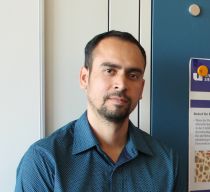
Tecnológico de Costa Rica, Costa
Rica
Host at the University of Siegen:
Univ-Prof. Dr.-Ing. Hans-Jürgen Christ
Univ-Prof. Dr.-Ing. Hans-Jürgen Christ
I am a Professor of Material Science and Engineering at the Tecnológico de Costa Rica (TEC) in Cartago, Costa Rica.
- Biomaterials and biomechanical analysis and tissue engineering;
Interest in research collaboration and participation at the 25th anniversary of the Chair of Materials Science and Testing.
At the University of Siegen I studied my M.Sc. in Mechatronics and Dr.-Ing. in Mechanical Engineering.
We are planning to apply for a student mobility project with the DAAD (German academic exchange service) and with the Bundesministerium für Bildung und Forschung (German Federal Ministry for education and research). Exactly when we will do so depends on whether these institutions issue calls this year or in future years.
Siegen is a multicultural city with a remarkable university where people and facilities make it possible to carry out different kinds of research. Especially in my field I find the University of Siegen to be a very strong partner with which to develop specialised research projects.
Prof. Dr. George Chagelishvilli
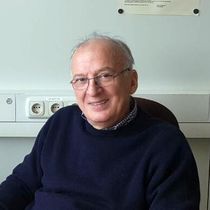
Tibilisi State University and
Ilia State University, Georgia
Host at the University of Siegen:
Univ.-Prof. Dr.-Ing. Dipl.-Phys. Holger Foysi
Chair of Fluid Mechanics
Academic of the Georgian National Academy of Sciences, Principal Research Scientist at the Institute of Geophysics, Tbilisi State University, and a Principal Research Scientist at the Abastumani Astrophysical Observatory, Ilia State University, Tbilisi, Georgia.
- Natural and engineering plasma and fluid dynamics;
- Linear phenomena induced by shear flow non-normality;
- Self-organization (including formation of spatiotemporal patterns) and turbulence in hydrodynamic and magnetohydrodynamic shear flow systems;
- Aeroacoustics of turbulent shear flows.
The purpose of my research visits is the investigation of aerodynamic sound generation (aeroacoustics) which is a major subject of fluid dynamics, with applications in wide areas of engineering problems, such as aircraft jet engines, naval and automotive applications. The emission of noise from mixing processes and turbulence of engineering flows is to be reduced owing to modern regulations, which require a substantial reduction of the perceived sound levels.
Working on this problem, we based our study on the rethinking of non-uniform/shear flow dynamics by the hydrodynamic stability community in 1990s. This approach, formed as a result of this rethinking, led to a breakthrough in the understanding and description of turbulence in different natural and engineering shear flows. Specifically, we adapted this trend of research to the aerodynamic sound generation in time-developing shear layers.
I have joint research and publications with Prof. Dr.-Ing. Foysi and Dr.-Ing. Khujadze where a new scheme of turbulence control is elaborated on the example of plane Couette flow. Our scientific interests also coincide in the field of aeroacoustics of shear flow systems. In my opinion the collaboration is quite productive and our perspective is to get closer to engineering flows.
Our future plans naturally follow from our efforts in the past and present. At first, we are planning to work on the control of the aerodynamic sound generation in time-developing shear layers. We also wish to apply the elaborated scheme of turbulence control to flows of practical interests, for instance, boundary layer flows.
Siegen is a pleasant city, very convenient for people who are visiting with a goal similar to mine: to live quietly and concentrate on science. However, it would be better if there were more guest house apartments at the University.
Dr. Özgül Kurtuluş Öztürk
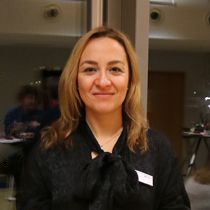
Bogazici University Istanbul,
Turkey
Host at the University of Siegen:
Univ.-Prof. Dr. Ullrich Pietsch
Chair of Solid State Physics
I am a Research Scientist at the University of Siegen Physics department. My last positon was as an Assistant Professor at the Bogazici University in Istanbul, Turkey.
I currently work in the field of solid state physics, specifically my project is about nanowires.
I actually did my post-doctoral degree here in Siegen. That was when I began work on my nanowires project. Nanomaterials could be inserted onto the graphene, and then by combining this with polymers we are able to produce new kinds of optoelectronic sensors.
After finishing my PhD in Istanbul I came to Siegen originally for my post doctoral degree and worked with Prof. Dr. Pietsch. After working in Istanbul for 8 years as an Assistant Professor, I have been offered a position here in Siegen.
The University of Siegen is great for my research, therefore I want to continue working on these projects here. We are currently performing experiments to optimise the graphene and nanowire samples further. As Richard Feynman, one of the first scientists to study nanomaterials, said, “there is plenty of room at the bottom.” So the possibilities with nanoscience are endless, with possible uses in the fields of biophysics, material science and pharmaceuticals.
I am also involved in a joint project about a synchrotron facility in Jordan. One of the most wonderful things about this project is that it highlights the power of science to bring people from different nations together. Even if their governments are currently not getting along with one another.
Compared to Istanbul, Siegen is like a different planet! But I find it nice living in a different city. Everyone here, especially Prof. Dr. Pietsch is very warm and welcoming. Also Siegen looks like a nice place to raise my child.
Dr. Daria Berdnikova
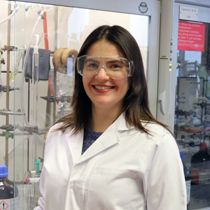
Russian Academy of Sciences,
Russian Federation
Host at the University of Siegen:
Univ.-Prof. Dr. Heiko Ihmels
Chair of Organic Chemistry II
I am a Marie Sklodowska-Curie fellow currently working on an independent European project at the University of Siegen. Before I was a Senior Researcher at the Russian Academy of Sciences in Moscow, Russian Federation.
Light-controlled interactions of organic molecules with nucleic acids.
On my last research visit, I performed investigations of organic molecules, which can be applied for light-controlled interactions with DNA. I design a molecule, synthesise it, check its photochemical properties, and then see if it can targetedly attack the nucleic acid upon irradiation. This approach can be used for killing undesirable cells, such as cancer cells. My current project is dealing with RNA instead of DNA, because this is more potential for medical and biological purposes.
My former supervisor in Russia already had an established collaboration with Prof. Dr. Ihmels here in Siegen, and they both encouraged me to apply for a short-term DAAD scholarship. After successfully receiving this scholarship in 2011, I came to Siegen to work with Prof. Dr. Ihmels for the first time. Later on, I returned to Siegen several times to perform small joint projects. In 2017, I finally moved here for my current 2-years long project with Prof. Dr. Ihmels.
The second half of my two-years research project has recently started. During the first year I obtained promising results on the interactions of photoswitchable compounds with HIV virus RNA. Now I continue working on the development of new approaches towards tunable visualisation of undesirable RNAs as well as treatment of bacterial and viral infections and some RNA-dependent genetic deceases. By the end of the present project I will try to get a new one to continue my research at the University of Siegen.
I’m originally from Moscow. It’s a very beautiful city, but at the same time it’s too large, noisy and overcrowded. Living in such a large city also made me feel separated from nature. So I adore Siegen because it has everything I need and I feel much closer to nature.
Dr. Gouri Shankar Giri
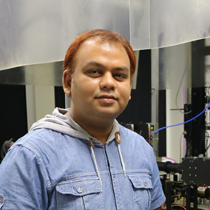
Rijksuniversiteit Gronigen, The
Netherlands
Host at the University of Siegen:
Univ.-Prof. Dr. Christof Wunderlich
Chair of Experimental Quantum Optics
I am a postdoctoral Research Fellow at the Physics Department at the University of Siegen. Originally I am from India, but my last position was in the Netherlands.
Quantum computing with trapped ions
I was a recipient of the Marie Sklodowska-Curie Fellowship in order to work with Prof. Dr. Wunderlich. Together we are developing essential elements for an ion trap based large-scale quantum computer.
I originally met Prof. Dr. Wunderlich at the University of Sussex in the U.K, whilst we were working on a large-scale EU project. Conventionally, logic gate operations in ion trap quantum computers are realised with optical radiation (such as lasers). Prof. Dr. Wunderlich proposed and demonstrated a new scheme that ensures realisation of logic gates using long wavelength radiation (such as microwaves). I was interested in working with him and I asked to join his research team in Germany. After successfully applying for the Marie Sklodowska-Curie Fellowship in 2014, I took up my position as a Postdoctoral Research Fellow here in Siegen.
I will continue to work toward the development of ion trap quantum computer in collaboration with the research department here. I expect quantum computing to hugely advance in the coming decades, with the potential to change how we use computers in many different fields.
Prof. Dr. Hyeongjoo Kim
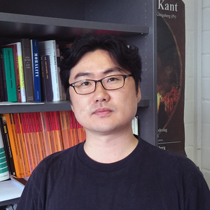
Chung-Ang University, Republic
of Korea
Host at the University of Siegen:
Univ.-Prof. Dr. Dieter Schönecker
Chair of Practical Philosophy
I am a Research Professor at the Humanities Research Institute at the Chung-Ang University in Seoul, Republic of Korea.
After I returned to Korea in November 2017, I have been working as a Research Professor on a project called “Artifical Intelligence Humanities“, this was supported by the National Research Foundation of Korea. My research is about the philosophy of Immanuel Kant, metaphysics and Didactics of Philosophy.
The purpose of my last research visit was to cooperate with my host Prof. Dr. Schönecker on a project called “Connecting appropriate teaching in primary schools (Sachunterricht vernetzen)“, furthermore we are writing a paper on “what is the meaning of the term empirical theorem? (was heißt empirischer Satz?)“.
I initially came to Siegen to work on my doctorate which I successfully completed on the empiricism of “I think“ of Kant’s “Critique of Pure Reason” at the University of Siegen. My supervisor was Prof. Dr. Schönecker.
We are planning to hand in a proposal on “Time Lecturer Support Project“ to the NRF (National Research Foundation of Korea). Which includes an examination of “A Dialectic of Thought and Being: Kant-Fichte comparison on their respective attitudes toward Descartes‘ Cogito-Thesis.”
Prof. Dr. Bo Song
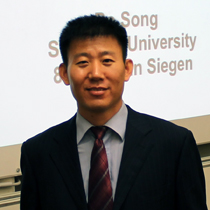
Soochow University, China
Host at the University of Siegen:
Univ.-Prof. Dr. Holger Schönherr
Chair of Physical Chemistry I
I am a Professor at Soochow University in Suzhou (Jiangsu), China.
- Supramolecular assembly
- Colloidal and interfaces
- Fluorescence probes for bio-imaging
The main target of my visit is to establish the collaboration with Prof. Dr. Schönherr in form of research study, exchange student, and bilateral joint fund. Actually, these items are connected, and will become each other’s support.
Currently, we nailed down the specific research collaboration starting with fluorescence measurement and interpretation. Besides Prof. Dr. Schönherr and I, Dr. Druzhinin, an expert on fluorescence, will be involved. Intensified discussion can be conducted via email or network meeting (for example Skype).
Around the end of 2017, we will try to encourage students to join the collaboration. From my side, I will try to find financial sources to support Master’s students to register as PhD students at the University of Siegen. The students will be co-guided by Prof. Dr. Schönherr and me. By doing this, on one hand we can have more close collaboration, and on the other hand we can expand to a larger scale collaboration involving more projects, students, and even professors.
The two aspects mentioned above will provide the basis for a bilateral joint fund application. We hope that the feedback of our lab-level collaboration can be expanded to the department level, and even further.
Dr. Alexey Yushkov
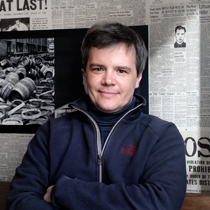
Czech Academy of Sciences, Czech
Republic
Host at the University of Siegen:
Univ.-Prof. Dr. Markus Risse
Experimental Particle Physics
I am a Senior Researcher at the Institute of Physics, Czech Academy of Sciences in Prague, Czech Republic. Coordinator of the physics task „Composition“ of the Pierre Auger Collaboration.
Experimental physics of ultra-high-energy cosmic rays.
Discussion of details of the common work on analysis of the mass composition of ultra-high energy cosmic rays and of the photon searches using data of the Pierre Auger Observatory. Coordination of various activities within the Auger collaboration for publications and discussion with the students of the Siegen group of their master and PhD projects.
PI had a postdoctoral position in the group of Prof. Dr. Risse (2013-2016)
Research topics described above will continue also after the two planned research visits and surely reach into the next 1-2 years. There are more analysis topics, not yet mentioned, that may later come in addition; also in terms of hardware expertise (electronics of Auger detectors) and of the ongoing upgrade of the Auger Observatory, communications may prove useful.
To this end, the present visits would also be used to check options for further third-party funding of research visits (like DAAD). This includes mutual visits of various group members (Siegen – Prague), with the aim to strengthen the links between the two working groups.
